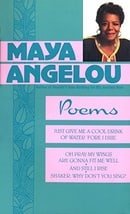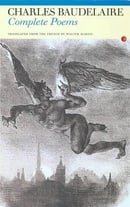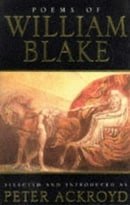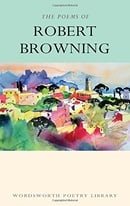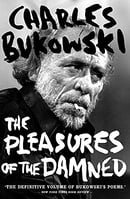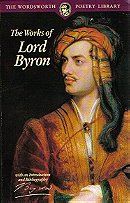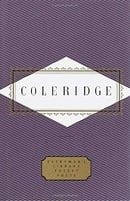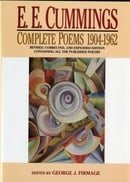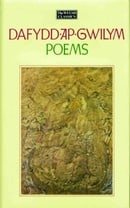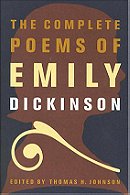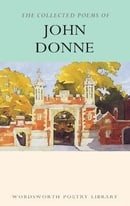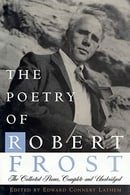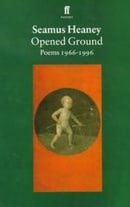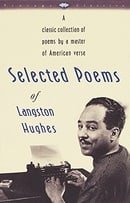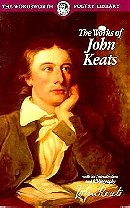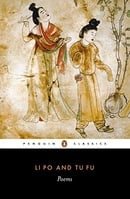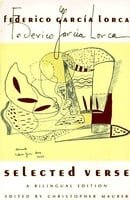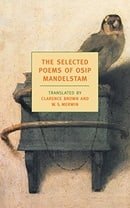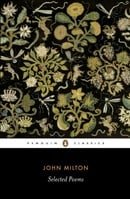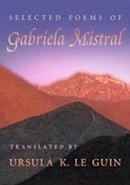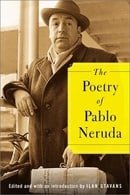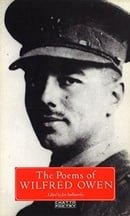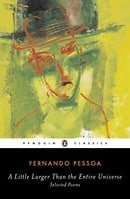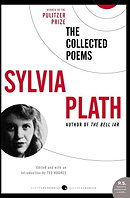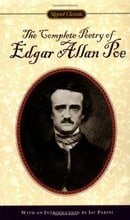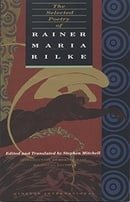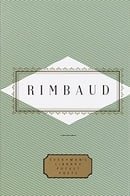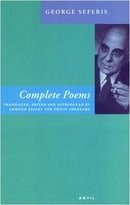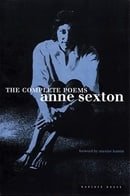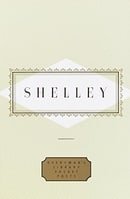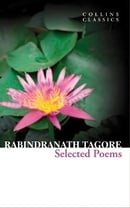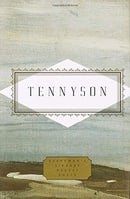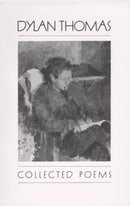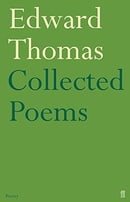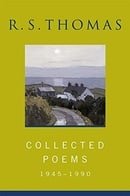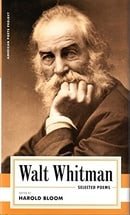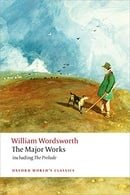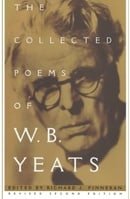Poets (and poems)
Sort by:
Showing 45 items
Rating:
List Type:
The Complete Poems of Anna Akhmatova - Anna Andreevna Akhmatova
ANNA AKHMATOVA: THAT CITY THAT I HAVE LOVED
That city that i have loved since i was a child
seemed to me today
in its December stillness
to be my squandered inheritance.
Everything that was handed to me spontaneously,
was so easy to give away:
the soul’s burning heat, the sounds of prayer,
and the grace of the first song-
all, all carried away in transparent smoke,
turned to ash in the depths of mirrors…
and now a noseless violinist
strikes up a tune from the irrevocable past.
With the curiosity of a foreigner
captivated by everything new
I listened to my Mother Tongue
and watch the sledges race.
Happiness blew in my face
with a wild freshness and force,
as though an eternally dear friend
accompanied me onto the steps.
(translation)
That city that i have loved since i was a child
seemed to me today
in its December stillness
to be my squandered inheritance.
Everything that was handed to me spontaneously,
was so easy to give away:
the soul’s burning heat, the sounds of prayer,
and the grace of the first song-
all, all carried away in transparent smoke,
turned to ash in the depths of mirrors…
and now a noseless violinist
strikes up a tune from the irrevocable past.
With the curiosity of a foreigner
captivated by everything new
I listened to my Mother Tongue
and watch the sledges race.
Happiness blew in my face
with a wild freshness and force,
as though an eternally dear friend
accompanied me onto the steps.
(translation)
Kenji's rating:


Maya Angelou: Poems - Maya Angelou
MAYA ANGELOU: PHENOMENAL WOMAN
Pretty women wonder where my secret lies.
I'm not cute or built to suit a fashion model's size
But when I start to tell them,
They think I'm telling lies.
I say,
It's in the reach of my arms
The span of my hips,
The stride of my step,
The curl of my lips.
I'm a woman
Phenomenally.
Phenomenal woman,
That's me.
I walk into a room
Just as cool as you please,
And to a man,
The fellows stand or
Fall down on their knees.
Then they swarm around me,
A hive of honey bees.
I say,
It's the fire in my eyes,
And the flash of my teeth,
The swing in my waist,
And the joy in my feet.
I'm a woman
Phenomenally.
Phenomenal woman,
That's me.
Men themselves have wondered
What they see in me.
They try so much
But they can't touch
My inner mystery.
When I try to show them
They say they still can't see.
I say,
It's in the arch of my back,
The sun of my smile,
The ride of my breasts,
The grace of my style.
I'm a woman
Phenomenally.
Phenomenal woman,
That's me.
Now you understand
Just why my head's not bowed.
I don't shout or jump about
Or have to talk real loud.
When you see me passing
It ought to make you proud.
I say,
It's in the click of my heels,
The bend of my hair,
the palm of my hand,
The need of my care,
'Cause I'm a woman
Phenomenally.
Phenomenal woman,
That's me.
Pretty women wonder where my secret lies.
I'm not cute or built to suit a fashion model's size
But when I start to tell them,
They think I'm telling lies.
I say,
It's in the reach of my arms
The span of my hips,
The stride of my step,
The curl of my lips.
I'm a woman
Phenomenally.
Phenomenal woman,
That's me.
I walk into a room
Just as cool as you please,
And to a man,
The fellows stand or
Fall down on their knees.
Then they swarm around me,
A hive of honey bees.
I say,
It's the fire in my eyes,
And the flash of my teeth,
The swing in my waist,
And the joy in my feet.
I'm a woman
Phenomenally.
Phenomenal woman,
That's me.
Men themselves have wondered
What they see in me.
They try so much
But they can't touch
My inner mystery.
When I try to show them
They say they still can't see.
I say,
It's in the arch of my back,
The sun of my smile,
The ride of my breasts,
The grace of my style.
I'm a woman
Phenomenally.
Phenomenal woman,
That's me.
Now you understand
Just why my head's not bowed.
I don't shout or jump about
Or have to talk real loud.
When you see me passing
It ought to make you proud.
I say,
It's in the click of my heels,
The bend of my hair,
the palm of my hand,
The need of my care,
'Cause I'm a woman
Phenomenally.
Phenomenal woman,
That's me.
BASHO: HAIKU
old pond
frog jumps in
sound of water
(translation.) Haiku: 3 line Japanese poems with 17 syllables (5-7-5)
old pond
frog jumps in
sound of water
(translation.) Haiku: 3 line Japanese poems with 17 syllables (5-7-5)
Kenji's rating:


Charles Baudelaire: Complete Poems (Poetry Pleiade)... - Charles Baudelaire
BAUDELAIRE: CORRESPONDENCES
Nature is a temple where living pillars
Let escape sometimes confused words;
Man traverses it through forests of symbols
That observe him with familiar glances.
Like long echoes that intermingle from afar
In a dark and profound unity,
Vast like the night and like the light,
The perfumes, the colors and the sounds respond.
There are perfumes fresh like the skin of infants
Sweet like oboes, green like prairies,
—And others corrupted, rich and triumphant
That have the expanse of infinite things,
Like ambergris, musk, balsam and incense,
Which sing the ecstasies of the mind and senses
(translation)
Nature is a temple where living pillars
Let escape sometimes confused words;
Man traverses it through forests of symbols
That observe him with familiar glances.
Like long echoes that intermingle from afar
In a dark and profound unity,
Vast like the night and like the light,
The perfumes, the colors and the sounds respond.
There are perfumes fresh like the skin of infants
Sweet like oboes, green like prairies,
—And others corrupted, rich and triumphant
That have the expanse of infinite things,
Like ambergris, musk, balsam and incense,
Which sing the ecstasies of the mind and senses
(translation)
Poems of William Blake - William Blake
BLAKE: THE GARDEN OF LOVE
I went to the Garden of Love,
And saw what i never had seen:
A chapel was built in the midst,
Where i used to play on the green.
And the gates of this Chapel were shut,
And “Thou shalt not” writ over the door;
So i turn’d to the Garden of Love
That so many sweet flowers bore;
And i saw it was filled with graves,
And tomb-stones where flowers should be;
And priests in black gowns were walking their rounds,
And binding with briars my joys and desires.
BLAKE: THE TYGER
Tyger! Tyger! burning bright
In the forests of the night,
What immortal hand or eye
Could frame thy fearful symmetry?
In what distant deeps or skies
Burnt the fire of thine eyes?
On what wings dare he aspire?
What the hand dare sieze the fire?
And what shoulder, & what art.
Could twist the sinews of thy heart?
And when thy heart began to beat,
What dread hand? & what dread feet?
What the hammer? what the chain?
In what furnace was thy brain?
What the anvil? what dread grasp
Dare its deadly terrors clasp?
When the stars threw down their spears,
And watered heaven with their tears,
Did he smile his work to see?
Did he who made the Lamb make thee?
Tyger! Tyger! burning bright
In the forests of the night,
What immortal hand or eye
Dare frame thy fearful symmetry?
I went to the Garden of Love,
And saw what i never had seen:
A chapel was built in the midst,
Where i used to play on the green.
And the gates of this Chapel were shut,
And “Thou shalt not” writ over the door;
So i turn’d to the Garden of Love
That so many sweet flowers bore;
And i saw it was filled with graves,
And tomb-stones where flowers should be;
And priests in black gowns were walking their rounds,
And binding with briars my joys and desires.
BLAKE: THE TYGER
Tyger! Tyger! burning bright
In the forests of the night,
What immortal hand or eye
Could frame thy fearful symmetry?
In what distant deeps or skies
Burnt the fire of thine eyes?
On what wings dare he aspire?
What the hand dare sieze the fire?
And what shoulder, & what art.
Could twist the sinews of thy heart?
And when thy heart began to beat,
What dread hand? & what dread feet?
What the hammer? what the chain?
In what furnace was thy brain?
What the anvil? what dread grasp
Dare its deadly terrors clasp?
When the stars threw down their spears,
And watered heaven with their tears,
Did he smile his work to see?
Did he who made the Lamb make thee?
Tyger! Tyger! burning bright
In the forests of the night,
What immortal hand or eye
Dare frame thy fearful symmetry?
Kenji's rating:


The Poems of Robert Browning (Wordsworth Poetry Library)... - Robert Browning
BROWNING: HOME THOUGHTS FROM ABROAD
Oh, to be in England
Now that April’s there,
And whoever wakes in England
Sees, some morning, unaware,
That the lowest boughs and the brushwood sheaf
Round the elm-tree bole are in tiny leaf,
While the chaffinch sings on the orchard bough
In England— now!
And after April, when May follows,
And the whitethroat builds, and all the swallows!
Hark, where my blossomed pear-tree in the hedge
Leans to the field and scatters on the clover
Blossoms and dewdrops—at the bent spray’s edge—
That’s the wise thrush; he sings each song twice over,
Lest you should think he never could recapture
The first fine careless rapture!
And though the fields look rough with hoary dew,
All will be gay when noontide wakes anew
The buttercups, the little children’s dower
—Far brighter than this gaudy melon-flower!
BROWNING: MY LAST DUCHESS
That's my last Duchess painted on the wall,
Looking as if she were alive. I call
That piece a wonder, now: Fra Pandolf’s hands
Worked busily a day, and there she stands.
Will’t please you sit and look at her? I said
“Fra Pandolf” by design, for never read
Strangers like you that pictured counte nance,
The depth and passion of its earnest glance,
But to myself they turned (since none puts by
The curtain I have drawn for you, but I)
And seemed as they would ask me, if they durst,
How such a glance came there; so, not the first
Are you to turn and ask thus. Sir, ’twas not
Her husband’s presence only, called that spot
Of joy into the Duchess’ cheek: perhaps
Fra Pandolf chanced to say “Her mantle laps
Over my lady’s wrist too much,” or “Paint
Must never hope to reproduce the faint
Half-flush that dies along her throat”: such stuff
Was courtesy, she thought, and cause enough
For calling up that spot of joy. She had
A heart—how shall I say?—too soon made glad,
Too easily impressed; she liked whate’er
She looked on, and her looks went everywhere.
Sir, ’twas all one! My favour at her breast,
The dropping of the daylight in the West,
The bough of cherries some officious fool
Broke in the orchard for her, the white mule
She rode with round the terrace—all and each
Would draw from her alike the approving speech,
Or blush, at least. She thanked men,—good! but thanked
Somehow—I know not how—as if she ranked
My gift of a nine-hundred-years-old name
With anybody’s gift. Who’d stoop to blame
This sort of trifling? Even had you skill
In speech—(which I have not)—to make your will
Quite clear to such an one, and say, “Just this
Or that in you disgusts me; here you miss,
Or there exceed the mark”—and if she let
Herself be lessoned so, nor plainly set
Her wits to yours, forsooth, and made excuse,
—E’en then would be some stooping; and I choose
Never to stoop. Oh sir, she smiled, no doubt,
Whene’er I passed her; but who passed without
Much the same smile? This grew; I gave commands;
Then all smiles stopped together. There she stands
As if alive. Will’t please you rise? We’ll meet
The company below, then. I repeat,
The Count your master’s known munificence
Is ample warrant that no just pretence
Of mine for dowry will be disallowed;
Though his fair daughter’s self, as I avowed
At starting, is my object. Nay, we’ll go
Together down, sir. Notice Neptune, though,
Taming a sea-horse, thought a rarity,
Which Claus of Innsbruck cast in bronze for me!
Oh, to be in England
Now that April’s there,
And whoever wakes in England
Sees, some morning, unaware,
That the lowest boughs and the brushwood sheaf
Round the elm-tree bole are in tiny leaf,
While the chaffinch sings on the orchard bough
In England— now!
And after April, when May follows,
And the whitethroat builds, and all the swallows!
Hark, where my blossomed pear-tree in the hedge
Leans to the field and scatters on the clover
Blossoms and dewdrops—at the bent spray’s edge—
That’s the wise thrush; he sings each song twice over,
Lest you should think he never could recapture
The first fine careless rapture!
And though the fields look rough with hoary dew,
All will be gay when noontide wakes anew
The buttercups, the little children’s dower
—Far brighter than this gaudy melon-flower!
BROWNING: MY LAST DUCHESS
That's my last Duchess painted on the wall,
Looking as if she were alive. I call
That piece a wonder, now: Fra Pandolf’s hands
Worked busily a day, and there she stands.
Will’t please you sit and look at her? I said
“Fra Pandolf” by design, for never read
Strangers like you that pictured counte nance,
The depth and passion of its earnest glance,
But to myself they turned (since none puts by
The curtain I have drawn for you, but I)
And seemed as they would ask me, if they durst,
How such a glance came there; so, not the first
Are you to turn and ask thus. Sir, ’twas not
Her husband’s presence only, called that spot
Of joy into the Duchess’ cheek: perhaps
Fra Pandolf chanced to say “Her mantle laps
Over my lady’s wrist too much,” or “Paint
Must never hope to reproduce the faint
Half-flush that dies along her throat”: such stuff
Was courtesy, she thought, and cause enough
For calling up that spot of joy. She had
A heart—how shall I say?—too soon made glad,
Too easily impressed; she liked whate’er
She looked on, and her looks went everywhere.
Sir, ’twas all one! My favour at her breast,
The dropping of the daylight in the West,
The bough of cherries some officious fool
Broke in the orchard for her, the white mule
She rode with round the terrace—all and each
Would draw from her alike the approving speech,
Or blush, at least. She thanked men,—good! but thanked
Somehow—I know not how—as if she ranked
My gift of a nine-hundred-years-old name
With anybody’s gift. Who’d stoop to blame
This sort of trifling? Even had you skill
In speech—(which I have not)—to make your will
Quite clear to such an one, and say, “Just this
Or that in you disgusts me; here you miss,
Or there exceed the mark”—and if she let
Herself be lessoned so, nor plainly set
Her wits to yours, forsooth, and made excuse,
—E’en then would be some stooping; and I choose
Never to stoop. Oh sir, she smiled, no doubt,
Whene’er I passed her; but who passed without
Much the same smile? This grew; I gave commands;
Then all smiles stopped together. There she stands
As if alive. Will’t please you rise? We’ll meet
The company below, then. I repeat,
The Count your master’s known munificence
Is ample warrant that no just pretence
Of mine for dowry will be disallowed;
Though his fair daughter’s self, as I avowed
At starting, is my object. Nay, we’ll go
Together down, sir. Notice Neptune, though,
Taming a sea-horse, thought a rarity,
Which Claus of Innsbruck cast in bronze for me!
The Pleasures of the Damned: Selected Poems 1951-1993... - Charles Bukowski
BUKOWSKI: PUTREFACTION
Of late
I’ve had this thought
that this country
has gone backwards
4 of 5 decades
and that all the
social advancement
the good feeling of
person toward
person
has been washed
away
and replaced
by the same
old
bigotries.
We have
more than ever
the selfish wants of power
the disregard for the
weak
the old
the impoverished
the
helpless.
We are replacing want with war
salvation with
slavery.
We have wasted the
gains
we have become
rapidly
less.
We have our Bomb
it is our fear
our damnation
and our
shame.
Now
something so sad
has hold of us
that
the breath
leaves
and we can’t even
cry.
BUKOWSKI: Society should realize...
you consult psychiatrists and philosophers
when things aren't going well
and whores when they are.
the whores are there for young boys and old
men; to the young boys they say,
'don't be frightened, honey, here I'll put t
in for you.'
and for the old guys
they put on an act
like you're really hooking it home.
society should realize the value of the
whore—I mean, those girls who really enjoy their
work—those who make it almost an
art form.
I'm thinking of the time
in a Mexican whorehouse
this gal with her little bowl and her rag
washing my dick,
and it got hard and she laughed and I
laughed and she
kissed it, gently and slowly, then she walked over and
spread out
on the bed
and I got on and we worked easily, no effort, no
tension, and some guy beat on the door and
yelled,
'Hey! what the hell's going on in there?
Hurry it up! '
but it was like a Mahler symphony—you just don't
rush
it.
when I finished and she came back, there was
the bowl and the rag again
and we both laughed; then she kissed it
gently and
slowly, and I got up and put my clothes back on and
walked out—
'Jesus, buddy, what the hell were ya doin' in
there? '
'Fuckin', ' I told the gentleman
and walked down the hall and down the steps and stood
outside in the road and lit one of those
sweet Mexican cigarettes in the moonlight.
liberated and human again
for a mere $3, I
loved the night, Mexico and
myself.
Of late
I’ve had this thought
that this country
has gone backwards
4 of 5 decades
and that all the
social advancement
the good feeling of
person toward
person
has been washed
away
and replaced
by the same
old
bigotries.
We have
more than ever
the selfish wants of power
the disregard for the
weak
the old
the impoverished
the
helpless.
We are replacing want with war
salvation with
slavery.
We have wasted the
gains
we have become
rapidly
less.
We have our Bomb
it is our fear
our damnation
and our
shame.
Now
something so sad
has hold of us
that
the breath
leaves
and we can’t even
cry.
BUKOWSKI: Society should realize...
you consult psychiatrists and philosophers
when things aren't going well
and whores when they are.
the whores are there for young boys and old
men; to the young boys they say,
'don't be frightened, honey, here I'll put t
in for you.'
and for the old guys
they put on an act
like you're really hooking it home.
society should realize the value of the
whore—I mean, those girls who really enjoy their
work—those who make it almost an
art form.
I'm thinking of the time
in a Mexican whorehouse
this gal with her little bowl and her rag
washing my dick,
and it got hard and she laughed and I
laughed and she
kissed it, gently and slowly, then she walked over and
spread out
on the bed
and I got on and we worked easily, no effort, no
tension, and some guy beat on the door and
yelled,
'Hey! what the hell's going on in there?
Hurry it up! '
but it was like a Mahler symphony—you just don't
rush
it.
when I finished and she came back, there was
the bowl and the rag again
and we both laughed; then she kissed it
gently and
slowly, and I got up and put my clothes back on and
walked out—
'Jesus, buddy, what the hell were ya doin' in
there? '
'Fuckin', ' I told the gentleman
and walked down the hall and down the steps and stood
outside in the road and lit one of those
sweet Mexican cigarettes in the moonlight.
liberated and human again
for a mere $3, I
loved the night, Mexico and
myself.
Kenji's rating:


BYRON: THE DESTRUCTION OF SENNACHERIB
The Assyrian came down like the wolf on the fold,
And his cohorts were gleaming in purple and gold;
And the sheen of their spears was like stars on the sea,
When the blue wave rolls nightly on deep Galilee.
Like the leaves of the forest when Summer is green,
That host with their banners at sunset were seen:
Like the leaves of the forest when Autumn hath blown,
That host on the morrow lay withered and strown.
For the Angel of Death spread his wings on the blast,
And breathed in the face of the foe as he pass’d,
And the eyes of the sleepers wax’d deadly and chill,
And their hearts but once heaved, and for ever grew still!
And there lay the steed with his nostril all wide,
But through it there roll’d not the breath of his pride;
And the foam of his gasping lay white on the turf,
And cold as the spray of the rock-beating surf.
And there lay the rider distorted and pale,
With the dew on his brow, and the rust on his mail:
And the tents were all silent, the banners alone,
The lances unlifted, the trumpets unblown.
And the widows of Ashur are loud in their wail,
And the idols are broke in the temple of Baal;
And the might of the Gentile, unsmote by the sword,
Hath melted like snow in the glance of the Lord!
The Assyrian came down like the wolf on the fold,
And his cohorts were gleaming in purple and gold;
And the sheen of their spears was like stars on the sea,
When the blue wave rolls nightly on deep Galilee.
Like the leaves of the forest when Summer is green,
That host with their banners at sunset were seen:
Like the leaves of the forest when Autumn hath blown,
That host on the morrow lay withered and strown.
For the Angel of Death spread his wings on the blast,
And breathed in the face of the foe as he pass’d,
And the eyes of the sleepers wax’d deadly and chill,
And their hearts but once heaved, and for ever grew still!
And there lay the steed with his nostril all wide,
But through it there roll’d not the breath of his pride;
And the foam of his gasping lay white on the turf,
And cold as the spray of the rock-beating surf.
And there lay the rider distorted and pale,
With the dew on his brow, and the rust on his mail:
And the tents were all silent, the banners alone,
The lances unlifted, the trumpets unblown.
And the widows of Ashur are loud in their wail,
And the idols are broke in the temple of Baal;
And the might of the Gentile, unsmote by the sword,
Hath melted like snow in the glance of the Lord!
Coleridge: Poems (Everyman's Library Pocket Poets)... - Samuel Taylor Coleridge
COLERIDGE: FROST AT MIDNIGHT
The Frost performs its secret ministry,
Unhelped by any wind. The owlet’s cry
Came loud, -and hark, again! loud as before.
The inmates of my cottage, all at rest,
Have left me to that solitude, which suits
Abstruser musings: save that at my side
My cradled infant slumbers peacefully.
’Tis calm indeed! so calm, that it disturbs
And vexes meditation with its strange
And extreme silentness. Sea, hill, and wood,
With all the numberless goings-on of life,
Inaudible as dreams! the thin blue flame
Lies on my low-burnt fire, and quivers not;
Only that film, which fluttered on the grate,
Still flutters there, the sole unquiet thing.
Methinks its motion in this hush of nature
Gives it dim sympathies with me who live,
Making it a companionable form,
Whose puny flaps and freaks the idling Spirit
By its own moods interprets, every where
Echo or mirror seeking of itself,
And makes a toy of Thought.
But O! how oft,
How oft, at school, with most believing mind,
Presageful, have I gazed upon the bars,
To watch that fluttering stranger! and as oft
With unclosed lids, already had I dreamt
Of my sweet birthplace, and the old church-tower,
Whose bells, the poor man’s only music, rang
From morn to evening, all the hot Fair-day,
So sweetly, that they stirred and haunted me
With a wild pleasure, falling on mine ear
Most like articulate sounds of things to come!
So gazed I, till the soothing things, I dreamt,
Lulled me to sleep, and sleep prolonged my dreams!
And so I brooded all the following morn,
Awed by the stern preceptor’s face, mine eye
Fixed with mock study on my swimming book:
Save if the door half opened, and I snatched
A hasty glance, and still my heart leaped up,
For still I hoped to see the stranger’s face,
Townsman, or aunt, or sister more beloved,
My playmate when we both were clothed alike!
Dear Babe, that sleepest cradled by my side,
Whose gentle breathings, heard in this deep calm,
Fill up the interspersed vacancies
And momentary pauses of the thought!
My babe so beautiful! it thrills my heart
With tender gladness, thus to look at thee,
And think that thou shalt learn far other lore,
And in far other scenes! For I was reared
In the great city, pent mid cloisters dim,
And saw nought lovely but the sky and stars.
But thou, my babe! shalt wander like a breeze
By lakes and sandy shores, beneath the crags
Of ancient mountain, and beneath the clouds,
Which image in their bulk both lakes and shores
And mountain crags: so shalt thou see and hear
The lovely shapes and sounds intelligible
Of that eternal language, which thy God
Utters, who from eternity doth teach
Himself in all, and all things in himself.
Great universal Teacher! he shall mould
Thy spirit, and by giving make it ask.
Therefore all seasons shall be sweet to thee,
Whether the summer clothe the general earth
With greenness, or the redbreast sit and sing
Betwixt the tufts of snow on the bare branch
Of mossy apple-tree, while the nigh thatch
Smokes in the sun-thaw; whether the eave-drops fall
Heard only in the trances of the blast,
Or if the secret ministry of frost
Shall hang them up in silent icicles,
Quietly shining to the quiet Moon.
COLERIDGE: KUBLA KHAN
In Xanadu did Kubla Khan
A stately pleasure dome decree:
Where Alph, the sacred river, ran
Through caverns measureless to man
Down to a sunless sea.
So twice five miles of fertile ground
With walls and towers were girdled round:
And there were gardens bright with sinuous rills,
Where blossomed many an incense-bearing tree;
And here were forests ancient as the hills,
Enfolding sunny spots of greenery.
But oh! that deep romantic chasm which slanted
Down the green hill athwart a cedarn cover!
A savage place! as holy and enchanted
As e'er beneath a waning moon was haunted
By woman wailing for her demon lover!
And from this chasm, with ceaseless turmoil seething,
As if this earth in fast thick pants were breathing,
A mighty fountain momently was forced:
Amid whose swift half-intermitted burst
Huge fragments vaulted like rebounding hail,
Or chaffy grain beneath the thresher's flail:
And 'mid these dancing rocks at once and ever
It flung up momently the sacred river.
Five miles meandering with a mazy motion
Through wood and dale the sacred river ran,
Then reached the caverns measureless to man,
And sank in tumult to a lifeless ocean:
And 'mid this tumult Kubla heard from far
Ancestral voices prophesying war!
The shadow of the dome of pleasure
Floated midway on the waves;
Where was heard the mingled measure
From the fountain and the caves.
It was a miracle of rare device,
A sunny pleasure-dome with caves of ice!
A damsel with a dulcimer
In a vision once I saw;
It was an Abyssinian maid,
And on her dulcimer she played,
Singing of Mount Abora.
Could I revive within me
Her symphony and song,
To such a deep delight 'twould win me,
That with music loud and long,
I would build that dome in air,
That sunny dome! those caves of ice!
And all who heard should see them there,
And all should cry, Beware! Beware!
His flashing eyes, his floating hair!
Weave a circle round him thrice,
And close your eyes with holy dread,
For he on honey-dew hath fed,
And drunk the milk of Paradise.
The Frost performs its secret ministry,
Unhelped by any wind. The owlet’s cry
Came loud, -and hark, again! loud as before.
The inmates of my cottage, all at rest,
Have left me to that solitude, which suits
Abstruser musings: save that at my side
My cradled infant slumbers peacefully.
’Tis calm indeed! so calm, that it disturbs
And vexes meditation with its strange
And extreme silentness. Sea, hill, and wood,
With all the numberless goings-on of life,
Inaudible as dreams! the thin blue flame
Lies on my low-burnt fire, and quivers not;
Only that film, which fluttered on the grate,
Still flutters there, the sole unquiet thing.
Methinks its motion in this hush of nature
Gives it dim sympathies with me who live,
Making it a companionable form,
Whose puny flaps and freaks the idling Spirit
By its own moods interprets, every where
Echo or mirror seeking of itself,
And makes a toy of Thought.
But O! how oft,
How oft, at school, with most believing mind,
Presageful, have I gazed upon the bars,
To watch that fluttering stranger! and as oft
With unclosed lids, already had I dreamt
Of my sweet birthplace, and the old church-tower,
Whose bells, the poor man’s only music, rang
From morn to evening, all the hot Fair-day,
So sweetly, that they stirred and haunted me
With a wild pleasure, falling on mine ear
Most like articulate sounds of things to come!
So gazed I, till the soothing things, I dreamt,
Lulled me to sleep, and sleep prolonged my dreams!
And so I brooded all the following morn,
Awed by the stern preceptor’s face, mine eye
Fixed with mock study on my swimming book:
Save if the door half opened, and I snatched
A hasty glance, and still my heart leaped up,
For still I hoped to see the stranger’s face,
Townsman, or aunt, or sister more beloved,
My playmate when we both were clothed alike!
Dear Babe, that sleepest cradled by my side,
Whose gentle breathings, heard in this deep calm,
Fill up the interspersed vacancies
And momentary pauses of the thought!
My babe so beautiful! it thrills my heart
With tender gladness, thus to look at thee,
And think that thou shalt learn far other lore,
And in far other scenes! For I was reared
In the great city, pent mid cloisters dim,
And saw nought lovely but the sky and stars.
But thou, my babe! shalt wander like a breeze
By lakes and sandy shores, beneath the crags
Of ancient mountain, and beneath the clouds,
Which image in their bulk both lakes and shores
And mountain crags: so shalt thou see and hear
The lovely shapes and sounds intelligible
Of that eternal language, which thy God
Utters, who from eternity doth teach
Himself in all, and all things in himself.
Great universal Teacher! he shall mould
Thy spirit, and by giving make it ask.
Therefore all seasons shall be sweet to thee,
Whether the summer clothe the general earth
With greenness, or the redbreast sit and sing
Betwixt the tufts of snow on the bare branch
Of mossy apple-tree, while the nigh thatch
Smokes in the sun-thaw; whether the eave-drops fall
Heard only in the trances of the blast,
Or if the secret ministry of frost
Shall hang them up in silent icicles,
Quietly shining to the quiet Moon.
COLERIDGE: KUBLA KHAN
In Xanadu did Kubla Khan
A stately pleasure dome decree:
Where Alph, the sacred river, ran
Through caverns measureless to man
Down to a sunless sea.
So twice five miles of fertile ground
With walls and towers were girdled round:
And there were gardens bright with sinuous rills,
Where blossomed many an incense-bearing tree;
And here were forests ancient as the hills,
Enfolding sunny spots of greenery.
But oh! that deep romantic chasm which slanted
Down the green hill athwart a cedarn cover!
A savage place! as holy and enchanted
As e'er beneath a waning moon was haunted
By woman wailing for her demon lover!
And from this chasm, with ceaseless turmoil seething,
As if this earth in fast thick pants were breathing,
A mighty fountain momently was forced:
Amid whose swift half-intermitted burst
Huge fragments vaulted like rebounding hail,
Or chaffy grain beneath the thresher's flail:
And 'mid these dancing rocks at once and ever
It flung up momently the sacred river.
Five miles meandering with a mazy motion
Through wood and dale the sacred river ran,
Then reached the caverns measureless to man,
And sank in tumult to a lifeless ocean:
And 'mid this tumult Kubla heard from far
Ancestral voices prophesying war!
The shadow of the dome of pleasure
Floated midway on the waves;
Where was heard the mingled measure
From the fountain and the caves.
It was a miracle of rare device,
A sunny pleasure-dome with caves of ice!
A damsel with a dulcimer
In a vision once I saw;
It was an Abyssinian maid,
And on her dulcimer she played,
Singing of Mount Abora.
Could I revive within me
Her symphony and song,
To such a deep delight 'twould win me,
That with music loud and long,
I would build that dome in air,
That sunny dome! those caves of ice!
And all who heard should see them there,
And all should cry, Beware! Beware!
His flashing eyes, his floating hair!
Weave a circle round him thrice,
And close your eyes with holy dread,
For he on honey-dew hath fed,
And drunk the milk of Paradise.
e e cummings: somewhere i have never travelled
somewhere i have never travelled, gladly beyond
any experience, your eyes have their silence:
in your most frail gesture are things which enclose me,
or which i cannot touch because they are too near
your slightest look easily will unclose me
though i have closed myself as fingers,
you open always petal by petal myself as Spring opens
(touching skilfully, mysteriously) her first rose
or if your wish be to close me, i and
my life will shut very beautifully,suddenly,
as when the heart of this flower imagines
the snow carefully everywhere descending;
nothing which we are to perceive in this world equals
the power of your intense fragility: whose texture
compels me with the color of its countries,
rendering death and forever with each breathing
(i do not know what it is about you that closes
and opens; only something in me understands
the voice of your eyes is deeper than all roses)
nobody, not even the rain, has such small hands
somewhere i have never travelled, gladly beyond
any experience, your eyes have their silence:
in your most frail gesture are things which enclose me,
or which i cannot touch because they are too near
your slightest look easily will unclose me
though i have closed myself as fingers,
you open always petal by petal myself as Spring opens
(touching skilfully, mysteriously) her first rose
or if your wish be to close me, i and
my life will shut very beautifully,suddenly,
as when the heart of this flower imagines
the snow carefully everywhere descending;
nothing which we are to perceive in this world equals
the power of your intense fragility: whose texture
compels me with the color of its countries,
rendering death and forever with each breathing
(i do not know what it is about you that closes
and opens; only something in me understands
the voice of your eyes is deeper than all roses)
nobody, not even the rain, has such small hands
DAFYDD AP GWILYM: MAY AND JANUARY
Greetings, splendid greenwood choir,
Summer's May month--since for that I long--
strong horseman, lover's recompense,
with a green fetter mastering the wild forest,
the friend of love and friend of birds;
lovers are mindful of him, their kinsman he is,
ambassador for nine score lovers' trysts
for honourable, loving dialogue.
By Mary, it is a delightful thing
that May, the perfect month, is on the way,
intent--in ardent affirmation of his rank--
upon the conquest of each verdant glen.
In a dense screen, the clothing of the high-roads,
he has dressed all the places in his web of green.
When there comes, after a battle with the frost'
the tent of thick leaves to invigorate the fields'
green will be the paths of May
succeeding April (birds' chirping is my faith);
on topmost branches of the oak will come
the singing of the new-fledged birds,
and the cuckoo high over each land,
and a songster; with a long and joyful day,
and white mist-haze after the wind
protects the middle of the valley,
and the sky at afternoon is clear and glad
with green trees and fresh gossamer,
and crowds of birds upon the trees,
and fresh leaves on forest saplings,
and Morfudd my golden girl, will come to [my] mind
with all love's seven-times-nine tumultuous turns.
All unlike to the sad black month
which rebukes everyone for loving,
and brings short days and depressing rain,
and wind that will despoil the trees,
and weakness--terrifying frailty--
a trailing cloak with rain and hail,
incitement to high tides, and colds,
grey flooding water-courses down the valleys,
rivers in spate with raucous noise,
and day-time sad and wearisome,
skies overcast, sombre and chill,
their hue hiding from us the moon.
Let there come to him--threat that's easy to predict--
evil two-fold for his boorishness!
(translation from Welsh, medieval poem)
Greetings, splendid greenwood choir,
Summer's May month--since for that I long--
strong horseman, lover's recompense,
with a green fetter mastering the wild forest,
the friend of love and friend of birds;
lovers are mindful of him, their kinsman he is,
ambassador for nine score lovers' trysts
for honourable, loving dialogue.
By Mary, it is a delightful thing
that May, the perfect month, is on the way,
intent--in ardent affirmation of his rank--
upon the conquest of each verdant glen.
In a dense screen, the clothing of the high-roads,
he has dressed all the places in his web of green.
When there comes, after a battle with the frost'
the tent of thick leaves to invigorate the fields'
green will be the paths of May
succeeding April (birds' chirping is my faith);
on topmost branches of the oak will come
the singing of the new-fledged birds,
and the cuckoo high over each land,
and a songster; with a long and joyful day,
and white mist-haze after the wind
protects the middle of the valley,
and the sky at afternoon is clear and glad
with green trees and fresh gossamer,
and crowds of birds upon the trees,
and fresh leaves on forest saplings,
and Morfudd my golden girl, will come to [my] mind
with all love's seven-times-nine tumultuous turns.
All unlike to the sad black month
which rebukes everyone for loving,
and brings short days and depressing rain,
and wind that will despoil the trees,
and weakness--terrifying frailty--
a trailing cloak with rain and hail,
incitement to high tides, and colds,
grey flooding water-courses down the valleys,
rivers in spate with raucous noise,
and day-time sad and wearisome,
skies overcast, sombre and chill,
their hue hiding from us the moon.
Let there come to him--threat that's easy to predict--
evil two-fold for his boorishness!
(translation from Welsh, medieval poem)
Kenji's rating:


The Complete Poems of Emily Dickinson - Emily Dickinson
EMILY DICKINSON: As imperceptibly as Grief
As imperceptibly as Grief
The Summer lapsed away—
Too imperceptible at last
To seem like Perfidy—
A Quietness distilled
As Twilight long begun,
Or Nature spending with herself
Sequestered Afternoon—
The Dusk drew earlier in—
The Morning foreign shone—
A courteous, yet harrowing Grace,
As Guest, that would be gone—
And thus, without a Wing
Or service of a Keel
Our Summer made her light escape
Into the Beautiful.
DICKINSON: Because I could not stop for Death
Because I could not stop for Death—
He kindly stopped for me—
The Carriage held but just Ourselves—
And Immortality.
We slowly drove—He knew no haste
And I had put away
My labor and my leisure too,
For His Civility—
We passed the School, where Children strove
At Recess—in the Ring
We passed the Fields of Gazing Grain—
We passed the Setting Sun—
Or rather—He passed Us—
The Dews drew quivering and chill—
For only Gossamer, my Gown—
My Tippet—only Tulle—
We paused before a House that seemed
A Swelling of the Ground—
The Roof was scarcely visible—
The Cornice—in the Ground—
Since then—'tis Centuries—and yet
Feels shorter than the Day
I first surmised the Horses' Heads
Were toward Eternity—
As imperceptibly as Grief
The Summer lapsed away—
Too imperceptible at last
To seem like Perfidy—
A Quietness distilled
As Twilight long begun,
Or Nature spending with herself
Sequestered Afternoon—
The Dusk drew earlier in—
The Morning foreign shone—
A courteous, yet harrowing Grace,
As Guest, that would be gone—
And thus, without a Wing
Or service of a Keel
Our Summer made her light escape
Into the Beautiful.
DICKINSON: Because I could not stop for Death
Because I could not stop for Death—
He kindly stopped for me—
The Carriage held but just Ourselves—
And Immortality.
We slowly drove—He knew no haste
And I had put away
My labor and my leisure too,
For His Civility—
We passed the School, where Children strove
At Recess—in the Ring
We passed the Fields of Gazing Grain—
We passed the Setting Sun—
Or rather—He passed Us—
The Dews drew quivering and chill—
For only Gossamer, my Gown—
My Tippet—only Tulle—
We paused before a House that seemed
A Swelling of the Ground—
The Roof was scarcely visible—
The Cornice—in the Ground—
Since then—'tis Centuries—and yet
Feels shorter than the Day
I first surmised the Horses' Heads
Were toward Eternity—
Kenji's rating:


The Collected Poems of John Donne (Wordsworth Poetry Library)... - John Donne_II
JOHN DONNE: THE SUN RISING.
Busy old fool, unruly Sun,
Why dost thou thus,
Through windows, and through curtains, call on us ?
Must to thy motions lovers' seasons run ?
Saucy pedantic wretch, go chide
Late school-boys and sour prentices,
Go tell court-huntsmen that the king will ride,
Call country ants to harvest offices ;
Love, all alike, no season knows nor clime,
Nor hours, days, months, which are the rags of time.
Thy beams so reverend, and strong
Why shouldst thou think ?
I could eclipse and cloud them with a wink,
But that I would not lose her sight so long.
If her eyes have not blinded thine,
Look, and to-morrow late tell me,
Whether both th' Indias of spice and mine
Be where thou left'st them, or lie here with me.
Ask for those kings whom thou saw'st yesterday,
And thou shalt hear, "All here in one bed lay."
She's all states, and all princes I ;
Nothing else is ;
Princes do but play us ; compared to this,
All honour's mimic, all wealth alchemy.
Thou, Sun, art half as happy as we,
In that the world's contracted thus ;
Thine age asks ease, and since thy duties be
To warm the world, that's done in warming us.
Shine here to us, and thou art everywhere ;
This bed thy center is, these walls thy sphere
Busy old fool, unruly Sun,
Why dost thou thus,
Through windows, and through curtains, call on us ?
Must to thy motions lovers' seasons run ?
Saucy pedantic wretch, go chide
Late school-boys and sour prentices,
Go tell court-huntsmen that the king will ride,
Call country ants to harvest offices ;
Love, all alike, no season knows nor clime,
Nor hours, days, months, which are the rags of time.
Thy beams so reverend, and strong
Why shouldst thou think ?
I could eclipse and cloud them with a wink,
But that I would not lose her sight so long.
If her eyes have not blinded thine,
Look, and to-morrow late tell me,
Whether both th' Indias of spice and mine
Be where thou left'st them, or lie here with me.
Ask for those kings whom thou saw'st yesterday,
And thou shalt hear, "All here in one bed lay."
She's all states, and all princes I ;
Nothing else is ;
Princes do but play us ; compared to this,
All honour's mimic, all wealth alchemy.
Thou, Sun, art half as happy as we,
In that the world's contracted thus ;
Thine age asks ease, and since thy duties be
To warm the world, that's done in warming us.
Shine here to us, and thou art everywhere ;
This bed thy center is, these walls thy sphere
Kenji's rating:


T S ELIOT: LA FIGLIA CHE PIANGE
Stand on the highest pavement of the stair—
Lean on a garden urn—
Weave, weave the sunlight in your hair—
Clasp your flowers to you with a pained surprise—
Fling them to the ground and turn
With a fugitive resentment in your eyes:
But weave, weave the sunlight in your hair.
So I would have had him leave,
So I would have had her stand and grieve,
So he would have left
As the soul leaves the body torn and bruised,
As the mind deserts the body it has used.
I should find
Some way incomparably light and deft,
Some way we both should understand,
Simple and faithless as a smile and shake of the hand.
She turned away, but with the autumn weather
Compelled my imagination many days,
Many days and many hours:
Her hair over her arms and her arms full of flowers.
And I wonder how they should have been together!
I should have lost a gesture and a pose.
Sometimes these cogitations still amaze
The troubled midnight and the noon’s repose.
T.S.ELIOT: THE LOVE SONG OF J.ALFRED PRUFROCK
'io credesse che mia risposta fosse
A persona che mai tornasse al mondo,
Questa fiamma staria senza piu scosse.
Ma perciocche giammai di questo fondo
Non torno vivo alcun, s'i'odo il vero,
Senza tema d'infamia ti rispondo.
Let us go then, you and I,
When the evening is spread out against the sky
Like a patient etherized upon a table;
Let us go, through certain half-deserted streets,
The muttering retreats
Of restless nights in one-night cheap hotels
And sawdust restaurants with oyster-shells:
Streets that follow like a tedious argument
Of insidious intent
To lead you to an overwhelming question. . . .
Oh, do not ask, "What is it?"
Let us go and make our visit.
In the room the women come and go
Talking of Michelangelo.
The yellow fog that rubs its back upon the window-panes,
The yellow smoke that rubs its muzzle on the window-panes,
Licked its tongue into the corners of the evening,
Lingered upon the pools that stand in drains,
Let fall upon its back the soot that falls from chimneys,
Slipped by the terrace, made a sudden leap,
And seeing that it was a soft October night,
Curled once about the house, and fell asleep.
And indeed there will be time
For the yellow smoke that slides along the street,
Rubbing its back upon the window-panes;
There will be time, there will be time
To prepare a face to meet the faces that you meet;
There will be time to murder and create,
And time for all the works and days of hands
That lift and drop a question on your plate;
Time for you and time for me,
And time yet for a hundred indecisions,
And for a hundred visions and revisions,
Before the taking of a toast and tea.
In the room the women come and go
Talking of Michelangelo.
And indeed there will be time
To wonder, "Do I dare?" and, "Do I dare?"
Time to turn back and descend the stair,
With a bald spot in the middle of my hair—
(They will say: "How his hair is growing thin!")
My morning coat, my collar mounting firmly to the chin,
My necktie rich and modest, but asserted by a simple pin—
(They will say: "But how his arms and legs are thin!")
Do I dare
Disturb the universe?
In a minute there is time
For decisions and revisions which a minute will reverse.
For I have known them all already, known them all:
Have known the evenings, mornings, afternoons,
I have measured out my life with coffee spoons;
I know the voices dying with a dying fall
Beneath the music from a farther room.
So how should I presume?
And I have known the eyes already, known them all—
The eyes that fix you in a formulated phrase,
And when I am formulated, sprawling on a pin,
When I am pinned and wriggling on the wall,
Then how should I begin
To spit out all the butt-ends of my days and ways?
And how should I presume?
And I have known the arms already, known them all—
Arms that are braceleted and white and bare
(But in the lamplight, downed with light brown hair!)
Is it perfume from a dress
That makes me so digress?
Arms that lie along a table, or wrap about a shawl.
And should I then presume?
And how should I begin?
* * * *
Shall I say, I have gone at dusk through narrow streets
And watched the smoke that rises from the pipes
Of lonely men in shirt-sleeves, leaning out of windows? . . .
I should have been a pair of ragged claws
Scuttling across the floors of silent seas.
* * * *
And the afternoon, the evening, sleeps so peacefully!
Smoothed by long fingers,
Asleep . . . tired . . . or it malingers,
Stretched on the floor, here beside you and me.
Should I, after tea and cakes and ices,
Have the strength to force the moment to its crisis?
But though I have wept and fasted, wept and prayed,
Though I have seen my head (grown slightly bald) brought in upon a platter,
I am no prophet—and here's no great matter;
I have seen the moment of my greatness flicker,
And I have seen the eternal Footman hold my coat, and snicker,
And in short, I was afraid.
And would it have been worth it, after all,
After the cups, the marmalade, the tea,
Among the porcelain, among some talk of you and me,
Would it have been worth while,
To have bitten off the matter with a smile,
To have squeezed the universe into a ball
To roll it toward some overwhelming question,
To say: "I am Lazarus, come from the dead,
Come back to tell you all, I shall tell you all"—
If one, settling a pillow by her head,
Should say: "That is not what I meant at all;
That is not it, at all."
And would it have been worth it, after all,
Would it have been worth while,
After the sunsets and the dooryards and the sprinkled streets,
After the novels, after the teacups, after the skirts that trail along the floor—
And this, and so much more?—
It is impossible to say just what I mean!
But as if a magic lantern threw the nerves in patterns on a screen:
Would it have been worth while
If one, settling a pillow or throwing off a shawl,
And turning toward the window, should say:
"That is not it at all,
That is not what I meant, at all."
* * * *
No! I am not Prince Hamlet, nor was meant to be;
Am an attendant lord, one that will do
To swell a progress, start a scene or two,
Advise the prince; no doubt, an easy tool,
Deferential, glad to be of use,
Politic, cautious, and meticulous;
Full of high sentence, but a bit obtuse;
At times, indeed, almost ridiculous—
Almost, at times, the Fool.
I grow old . . . I grow old . . .
I shall wear the bottoms of my trousers rolled.
Shall I part my hair behind? Do I dare to eat a peach?
I shall wear white flannel trousers, and walk upon the beach.
I have heard the mermaids singing, each to each.
I do not think that they will sing to me.
I have seen them riding seaward on the waves
Combing the white hair of the waves blown back
When the wind blows the water white and black.
We have lingered in the chambers of the sea
By sea-girls wreathed with seaweed red and brown
Till human voices wake us, and we drown.
Stand on the highest pavement of the stair—
Lean on a garden urn—
Weave, weave the sunlight in your hair—
Clasp your flowers to you with a pained surprise—
Fling them to the ground and turn
With a fugitive resentment in your eyes:
But weave, weave the sunlight in your hair.
So I would have had him leave,
So I would have had her stand and grieve,
So he would have left
As the soul leaves the body torn and bruised,
As the mind deserts the body it has used.
I should find
Some way incomparably light and deft,
Some way we both should understand,
Simple and faithless as a smile and shake of the hand.
She turned away, but with the autumn weather
Compelled my imagination many days,
Many days and many hours:
Her hair over her arms and her arms full of flowers.
And I wonder how they should have been together!
I should have lost a gesture and a pose.
Sometimes these cogitations still amaze
The troubled midnight and the noon’s repose.
T.S.ELIOT: THE LOVE SONG OF J.ALFRED PRUFROCK
'io credesse che mia risposta fosse
A persona che mai tornasse al mondo,
Questa fiamma staria senza piu scosse.
Ma perciocche giammai di questo fondo
Non torno vivo alcun, s'i'odo il vero,
Senza tema d'infamia ti rispondo.
Let us go then, you and I,
When the evening is spread out against the sky
Like a patient etherized upon a table;
Let us go, through certain half-deserted streets,
The muttering retreats
Of restless nights in one-night cheap hotels
And sawdust restaurants with oyster-shells:
Streets that follow like a tedious argument
Of insidious intent
To lead you to an overwhelming question. . . .
Oh, do not ask, "What is it?"
Let us go and make our visit.
In the room the women come and go
Talking of Michelangelo.
The yellow fog that rubs its back upon the window-panes,
The yellow smoke that rubs its muzzle on the window-panes,
Licked its tongue into the corners of the evening,
Lingered upon the pools that stand in drains,
Let fall upon its back the soot that falls from chimneys,
Slipped by the terrace, made a sudden leap,
And seeing that it was a soft October night,
Curled once about the house, and fell asleep.
And indeed there will be time
For the yellow smoke that slides along the street,
Rubbing its back upon the window-panes;
There will be time, there will be time
To prepare a face to meet the faces that you meet;
There will be time to murder and create,
And time for all the works and days of hands
That lift and drop a question on your plate;
Time for you and time for me,
And time yet for a hundred indecisions,
And for a hundred visions and revisions,
Before the taking of a toast and tea.
In the room the women come and go
Talking of Michelangelo.
And indeed there will be time
To wonder, "Do I dare?" and, "Do I dare?"
Time to turn back and descend the stair,
With a bald spot in the middle of my hair—
(They will say: "How his hair is growing thin!")
My morning coat, my collar mounting firmly to the chin,
My necktie rich and modest, but asserted by a simple pin—
(They will say: "But how his arms and legs are thin!")
Do I dare
Disturb the universe?
In a minute there is time
For decisions and revisions which a minute will reverse.
For I have known them all already, known them all:
Have known the evenings, mornings, afternoons,
I have measured out my life with coffee spoons;
I know the voices dying with a dying fall
Beneath the music from a farther room.
So how should I presume?
And I have known the eyes already, known them all—
The eyes that fix you in a formulated phrase,
And when I am formulated, sprawling on a pin,
When I am pinned and wriggling on the wall,
Then how should I begin
To spit out all the butt-ends of my days and ways?
And how should I presume?
And I have known the arms already, known them all—
Arms that are braceleted and white and bare
(But in the lamplight, downed with light brown hair!)
Is it perfume from a dress
That makes me so digress?
Arms that lie along a table, or wrap about a shawl.
And should I then presume?
And how should I begin?
* * * *
Shall I say, I have gone at dusk through narrow streets
And watched the smoke that rises from the pipes
Of lonely men in shirt-sleeves, leaning out of windows? . . .
I should have been a pair of ragged claws
Scuttling across the floors of silent seas.
* * * *
And the afternoon, the evening, sleeps so peacefully!
Smoothed by long fingers,
Asleep . . . tired . . . or it malingers,
Stretched on the floor, here beside you and me.
Should I, after tea and cakes and ices,
Have the strength to force the moment to its crisis?
But though I have wept and fasted, wept and prayed,
Though I have seen my head (grown slightly bald) brought in upon a platter,
I am no prophet—and here's no great matter;
I have seen the moment of my greatness flicker,
And I have seen the eternal Footman hold my coat, and snicker,
And in short, I was afraid.
And would it have been worth it, after all,
After the cups, the marmalade, the tea,
Among the porcelain, among some talk of you and me,
Would it have been worth while,
To have bitten off the matter with a smile,
To have squeezed the universe into a ball
To roll it toward some overwhelming question,
To say: "I am Lazarus, come from the dead,
Come back to tell you all, I shall tell you all"—
If one, settling a pillow by her head,
Should say: "That is not what I meant at all;
That is not it, at all."
And would it have been worth it, after all,
Would it have been worth while,
After the sunsets and the dooryards and the sprinkled streets,
After the novels, after the teacups, after the skirts that trail along the floor—
And this, and so much more?—
It is impossible to say just what I mean!
But as if a magic lantern threw the nerves in patterns on a screen:
Would it have been worth while
If one, settling a pillow or throwing off a shawl,
And turning toward the window, should say:
"That is not it at all,
That is not what I meant, at all."
* * * *
No! I am not Prince Hamlet, nor was meant to be;
Am an attendant lord, one that will do
To swell a progress, start a scene or two,
Advise the prince; no doubt, an easy tool,
Deferential, glad to be of use,
Politic, cautious, and meticulous;
Full of high sentence, but a bit obtuse;
At times, indeed, almost ridiculous—
Almost, at times, the Fool.
I grow old . . . I grow old . . .
I shall wear the bottoms of my trousers rolled.
Shall I part my hair behind? Do I dare to eat a peach?
I shall wear white flannel trousers, and walk upon the beach.
I have heard the mermaids singing, each to each.
I do not think that they will sing to me.
I have seen them riding seaward on the waves
Combing the white hair of the waves blown back
When the wind blows the water white and black.
We have lingered in the chambers of the sea
By sea-girls wreathed with seaweed red and brown
Till human voices wake us, and we drown.
ROBERT FROST: THE ROAD NOT TAKEN
Two roads diverged in a yellow wood,
And sorry I could not travel both
And be one traveler, long I stood
And looked down one as far as I could
To where it bent in the undergrowth;
Then took the other, as just as fair,
And having perhaps the better claim,
Because it was grassy and wanted wear;
Though as for that the passing there
Had worn them really about the same,
And both that morning equally lay
In leaves no step had trodden black.
Oh, I kept the first for another day!
Yet knowing how way leads on to way,
I doubted if I should ever come back.
I shall be telling this with a sigh
Somewhere ages and ages hence:
Two roads diverged in a wood, and I—
I took the one less traveled by,
And that has made all the difference
Two roads diverged in a yellow wood,
And sorry I could not travel both
And be one traveler, long I stood
And looked down one as far as I could
To where it bent in the undergrowth;
Then took the other, as just as fair,
And having perhaps the better claim,
Because it was grassy and wanted wear;
Though as for that the passing there
Had worn them really about the same,
And both that morning equally lay
In leaves no step had trodden black.
Oh, I kept the first for another day!
Yet knowing how way leads on to way,
I doubted if I should ever come back.
I shall be telling this with a sigh
Somewhere ages and ages hence:
Two roads diverged in a wood, and I—
I took the one less traveled by,
And that has made all the difference
Kenji's rating:


ALLEN GINSBERG: A SUPERMARKET IN CALIFORNIA
What thoughts I have of you tonight, Walt Whitman, for
I walked down the sidestreets under the trees with a headache
self-conscious looking at the full moon.
In my hungry fatigue, and shopping for images, I went
into the neon fruit supermarket, dreaming of your enumerations!
What peaches and what penumbras! Whole families
shopping at night! Aisles full of husbands! Wives in the
avocados, babies in the tomatoes!--and you, Garcia Lorca, what
were you doing down by the watermelons?
I saw you, Walt Whitman, childless, lonely old grubber,
poking among the meats in the refrigerator and eyeing the grocery
boys.
I heard you asking questions of each: Who killed the
pork chops? What price bananas? Are you my Angel?
I wandered in and out of the brilliant stacks of cans
following you, and followed in my imagination by the store
detective.
We strode down the open corridors together in our
solitary fancy tasting artichokes, possessing every frozen
delicacy, and never passing the cashier.
Where are we going, Walt Whitman? The doors close in
an hour. Which way does your beard point tonight?
(I touch your book and dream of our odyssey in the
supermarket and feel absurd.)
Will we walk all night through solitary streets? The
trees add shade to shade, lights out in the houses, we'll both be
lonely.
Will we stroll dreaming of the lost America of love
past blue automobiles in driveways, home to our silent cottage?
Ah, dear father, graybeard, lonely old courage-teacher,
what America did you have when Charon quit poling his ferry and
you got out on a smoking bank and stood watching the boat
disappear on the black waters of Lethe?
What thoughts I have of you tonight, Walt Whitman, for
I walked down the sidestreets under the trees with a headache
self-conscious looking at the full moon.
In my hungry fatigue, and shopping for images, I went
into the neon fruit supermarket, dreaming of your enumerations!
What peaches and what penumbras! Whole families
shopping at night! Aisles full of husbands! Wives in the
avocados, babies in the tomatoes!--and you, Garcia Lorca, what
were you doing down by the watermelons?
I saw you, Walt Whitman, childless, lonely old grubber,
poking among the meats in the refrigerator and eyeing the grocery
boys.
I heard you asking questions of each: Who killed the
pork chops? What price bananas? Are you my Angel?
I wandered in and out of the brilliant stacks of cans
following you, and followed in my imagination by the store
detective.
We strode down the open corridors together in our
solitary fancy tasting artichokes, possessing every frozen
delicacy, and never passing the cashier.
Where are we going, Walt Whitman? The doors close in
an hour. Which way does your beard point tonight?
(I touch your book and dream of our odyssey in the
supermarket and feel absurd.)
Will we walk all night through solitary streets? The
trees add shade to shade, lights out in the houses, we'll both be
lonely.
Will we stroll dreaming of the lost America of love
past blue automobiles in driveways, home to our silent cottage?
Ah, dear father, graybeard, lonely old courage-teacher,
what America did you have when Charon quit poling his ferry and
you got out on a smoking bank and stood watching the boat
disappear on the black waters of Lethe?
HEANEY: THE RAILWAY CHILDREN
When we climbed the slopes of the cutting
We were eye-level with the white cups
Of the telegraph poles and the sizzling wires.
Like lovely freehand they curved for miles
East and miles west beyond us, sagging
Under their burden of swallows.
We were small and thought we knew nothing
Worth knowing. We thought words traveled the wires
In the shiny pouches of raindrops,
Each one seeded full with the light
Of the sky, the gleam of the lines, and ourselves
So infinitesimally scaled
We could stream through the eye of a needle
When we climbed the slopes of the cutting
We were eye-level with the white cups
Of the telegraph poles and the sizzling wires.
Like lovely freehand they curved for miles
East and miles west beyond us, sagging
Under their burden of swallows.
We were small and thought we knew nothing
Worth knowing. We thought words traveled the wires
In the shiny pouches of raindrops,
Each one seeded full with the light
Of the sky, the gleam of the lines, and ourselves
So infinitesimally scaled
We could stream through the eye of a needle
Selected Poems of Langston Hughes (Vintage Classics)... - Langston Hughes
LANGSTON HUGHES: THE NEGRO SPEAKS OF RIVERS
I've known rivers:
I've known rivers ancient as the world and older than the
flow of human blood in human veins.
My soul has grown deep like the rivers.
I bathed in the Euphrates when dawns were young.
I built my hut near the Congo and it lulled me to sleep.
I looked upon the Nile and raised the pyramids above it.
I heard the singing of the Mississippi when Abe Lincoln
went down to New Orleans, and I've seen its muddy
bosom turn all golden in the sunset.
I've known rivers:
Ancient, dusky rivers.
My soul has grown deep like the rivers.
I've known rivers:
I've known rivers ancient as the world and older than the
flow of human blood in human veins.
My soul has grown deep like the rivers.
I bathed in the Euphrates when dawns were young.
I built my hut near the Congo and it lulled me to sleep.
I looked upon the Nile and raised the pyramids above it.
I heard the singing of the Mississippi when Abe Lincoln
went down to New Orleans, and I've seen its muddy
bosom turn all golden in the sunset.
I've known rivers:
Ancient, dusky rivers.
My soul has grown deep like the rivers.
The Works of John Keats - John Keats
KEATS: ODE TO A NIGHTINGALE
My heart aches, and a drowsy numbness pains
My sense, as though of hemlock I had drunk,
Or emptied some dull opiate to the drains
One minute past, and Lethe-wards had sunk:
’Tis not through envy of thy happy lot,
But being too happy in thine happiness,—
That thou, light-winged Dryad of the trees
In some melodious plot
Of beechen green, and shadows numberless,
Singest of summer in full-throated ease.
O, for a draught of vintage! that hath been
Cool’d a long age in the deep-delved earth,
Tasting of Flora and the country green,
Dance, and Provençal song, and sunburnt mirth!
O for a beaker full of the warm South,
Full of the true, the blushful Hippocrene,
With beaded bubbles winking at the brim,
And purple-stained mouth;
That I might drink, and leave the world unseen,
And with thee fade away into the forest dim:
Fade far away, dissolve, and quite forget
What thou among the leaves hast never known,
The weariness, the fever, and the fret
Here, where men sit and hear each other groan;
Where palsy shakes a few, sad, last gray hairs,
Where youth grows pale, and spectre-thin, and dies;
Where but to think is to be full of sorrow
And leaden-eyed despairs,
Where Beauty cannot keep her lustrous eyes,
Or new Love pine at them beyond to-morrow.
Away! away! for I will fly to thee,
Not charioted by Bacchus and his pards,
But on the viewless wings of Poesy,
Though the dull brain perplexes and retards:
Already with thee! tender is the night,
And haply the Queen-Moon is on her throne,
Cluster’d around by all her starry Fays;
But here there is no light,
Save what from heaven is with the breezes blown
Through verdurous glooms and winding mossy ways.
I cannot see what flowers are at my feet,
Nor what soft incense hangs upon the boughs,
But, in embalmed darkness, guess each sweet
Wherewith the seasonable month endows
The grass, the thicket, and the fruit-tree wild;
White hawthorn, and the pastoral eglantine;
Fast fading violets cover’d up in leaves;
And mid-May’s eldest child,
The coming musk-rose, full of dewy wine,
The murmurous haunt of flies on summer eves.
Darkling I listen; and, for many a time
I have been half in love with easeful Death,
Call’d him soft names in many a mused rhyme,
To take into the air my quiet breath;
Now more than ever seems it rich to die,
To cease upon the midnight with no pain,
While thou art pouring forth thy soul abroad
In such an ecstasy!
Still wouldst thou sing, and I have ears in vain—
To thy high requiem become a sod.
Thou wast not born for death, immortal Bird!
No hungry generations tread thee down;
The voice I hear this passing night was heard
In ancient days by emperor and clown:
Perhaps the self-same song that found a path
Through the sad heart of Ruth, when, sick for home,
She stood in tears amid the alien corn;
The same that oft-times hath
Charm’d magic casements, opening on the foam
Of perilous seas, in faery lands forlorn.
Forlorn! the very word is like a bell
To toll me back from thee to my sole self!
Adieu! the fancy cannot cheat so well
As she is fam’d to do, deceiving elf.
Adieu! adieu! thy plaintive anthem fades
Past the near meadows, over the still stream,
Up the hill-side; and now ’tis buried deep
In the next valley-glades:
Was it a vision, or a waking dream?
Fled is that music:—Do I wake or sleep?
KEATS: TO AUTUMN
Season of mists and mellow fruitfulness
Close bosom-friend of the maturing sun
Conspiring with him how to load and bless
With fruit the vines that round the thatch-eaves run;
To bend with apples the moss'd cottage-trees,
And fill all fruit with ripeness to the core;
To swell the gourd, and plump the hazel shells
With a sweet kernel; to set budding more,
And still more, later flowers for the bees,
Until they think warm days will never cease,
For Summer has o'er-brimm'd their clammy cells.
Who hath not seen thee oft amid thy store?
Sometimes whoever seeks abroad may find
Thee sitting careless on a granary floor,
Thy hair soft-lifted by the winnowing wind;
Or on a half-reap'd furrow sound asleep,
Drows'd with the fume of poppies, while thy hook
Spares the next swath and all its twined flowers:
And sometimes like a gleaner thou dost keep
Steady thy laden head across a brook;
Or by a cider-press, with patient look,
Thou watchest the last oozings hours by hours.
Where are the songs of Spring? Ay, where are they?
Think not of them, thou hast thy music too,-
While barred clouds bloom the soft-dying day,
And touch the stubble-plains with rosy hue;
Then in a wailful choir the small gnats mourn
Among the river sallows, borne aloft
Or sinking as the light wind lives or dies;
And full-grown lambs loud bleat from hilly bourn;
Hedge-crickets sing; and now with treble soft
The red-breast whistles from a garden-croft;
And gathering swallows twitter in the skies.
My heart aches, and a drowsy numbness pains
My sense, as though of hemlock I had drunk,
Or emptied some dull opiate to the drains
One minute past, and Lethe-wards had sunk:
’Tis not through envy of thy happy lot,
But being too happy in thine happiness,—
That thou, light-winged Dryad of the trees
In some melodious plot
Of beechen green, and shadows numberless,
Singest of summer in full-throated ease.
O, for a draught of vintage! that hath been
Cool’d a long age in the deep-delved earth,
Tasting of Flora and the country green,
Dance, and Provençal song, and sunburnt mirth!
O for a beaker full of the warm South,
Full of the true, the blushful Hippocrene,
With beaded bubbles winking at the brim,
And purple-stained mouth;
That I might drink, and leave the world unseen,
And with thee fade away into the forest dim:
Fade far away, dissolve, and quite forget
What thou among the leaves hast never known,
The weariness, the fever, and the fret
Here, where men sit and hear each other groan;
Where palsy shakes a few, sad, last gray hairs,
Where youth grows pale, and spectre-thin, and dies;
Where but to think is to be full of sorrow
And leaden-eyed despairs,
Where Beauty cannot keep her lustrous eyes,
Or new Love pine at them beyond to-morrow.
Away! away! for I will fly to thee,
Not charioted by Bacchus and his pards,
But on the viewless wings of Poesy,
Though the dull brain perplexes and retards:
Already with thee! tender is the night,
And haply the Queen-Moon is on her throne,
Cluster’d around by all her starry Fays;
But here there is no light,
Save what from heaven is with the breezes blown
Through verdurous glooms and winding mossy ways.
I cannot see what flowers are at my feet,
Nor what soft incense hangs upon the boughs,
But, in embalmed darkness, guess each sweet
Wherewith the seasonable month endows
The grass, the thicket, and the fruit-tree wild;
White hawthorn, and the pastoral eglantine;
Fast fading violets cover’d up in leaves;
And mid-May’s eldest child,
The coming musk-rose, full of dewy wine,
The murmurous haunt of flies on summer eves.
Darkling I listen; and, for many a time
I have been half in love with easeful Death,
Call’d him soft names in many a mused rhyme,
To take into the air my quiet breath;
Now more than ever seems it rich to die,
To cease upon the midnight with no pain,
While thou art pouring forth thy soul abroad
In such an ecstasy!
Still wouldst thou sing, and I have ears in vain—
To thy high requiem become a sod.
Thou wast not born for death, immortal Bird!
No hungry generations tread thee down;
The voice I hear this passing night was heard
In ancient days by emperor and clown:
Perhaps the self-same song that found a path
Through the sad heart of Ruth, when, sick for home,
She stood in tears amid the alien corn;
The same that oft-times hath
Charm’d magic casements, opening on the foam
Of perilous seas, in faery lands forlorn.
Forlorn! the very word is like a bell
To toll me back from thee to my sole self!
Adieu! the fancy cannot cheat so well
As she is fam’d to do, deceiving elf.
Adieu! adieu! thy plaintive anthem fades
Past the near meadows, over the still stream,
Up the hill-side; and now ’tis buried deep
In the next valley-glades:
Was it a vision, or a waking dream?
Fled is that music:—Do I wake or sleep?
KEATS: TO AUTUMN
Season of mists and mellow fruitfulness
Close bosom-friend of the maturing sun
Conspiring with him how to load and bless
With fruit the vines that round the thatch-eaves run;
To bend with apples the moss'd cottage-trees,
And fill all fruit with ripeness to the core;
To swell the gourd, and plump the hazel shells
With a sweet kernel; to set budding more,
And still more, later flowers for the bees,
Until they think warm days will never cease,
For Summer has o'er-brimm'd their clammy cells.
Who hath not seen thee oft amid thy store?
Sometimes whoever seeks abroad may find
Thee sitting careless on a granary floor,
Thy hair soft-lifted by the winnowing wind;
Or on a half-reap'd furrow sound asleep,
Drows'd with the fume of poppies, while thy hook
Spares the next swath and all its twined flowers:
And sometimes like a gleaner thou dost keep
Steady thy laden head across a brook;
Or by a cider-press, with patient look,
Thou watchest the last oozings hours by hours.
Where are the songs of Spring? Ay, where are they?
Think not of them, thou hast thy music too,-
While barred clouds bloom the soft-dying day,
And touch the stubble-plains with rosy hue;
Then in a wailful choir the small gnats mourn
Among the river sallows, borne aloft
Or sinking as the light wind lives or dies;
And full-grown lambs loud bleat from hilly bourn;
Hedge-crickets sing; and now with treble soft
The red-breast whistles from a garden-croft;
And gathering swallows twitter in the skies.
Kenji's rating:


LI PO: THE RIVER MERCHANT'S WIFE
While my hair was still cut straight across my forehead
I played about the front gate, pulling flowers.
You came by on bamboo stilts, playing horse,
You walked about my seat, playing with blue plums.
And we went on living in the village of Chokan:
Two small people, without dislike or suspicion.
At fourteen I married My Lord you.
I never laughed, being bashful.
Lowering my head, I looked at the wall.
Called to, a thousand times, I never looked back.
At fifteen I stopped scowling,
I desired my dust to be mingled with yours
Forever and forever and forever.
Why should I climb the look out?
At sixteen you departed,
You went into far Ku-to-en, by the river of swirling eddies,
And you have been gone five months.
The monkeys make sorrowful noise overhead.
You dragged your feet when you went out.
By the gate now, the moss is grown, the different mosses,
Too deep to clear them away!
The leaves fall early this autumn, in wind.
The paired butterflies are already yellow with August
Over the grass in the West garden;
They hurt me. I grow older.
If you are coming down through the narrows of the river Kiang,
Please let me know beforehand,
And I will come out to meet you
As far as Cho-fu-Sa.
(translation, Ezra Pound)
TU FU: FULL MOON
Above the tower — a lone, twice-sized moon.
On the cold river passing night-filled homes,
It scatters restless gold across the waves.
On mats, it shines richer than silken gauze.
Empty peaks, silence: among sparse stars,
Not yet flawed, it drifts. Pine and cinnamon
Spreading in my old garden . . . All light,
All ten thousand miles at once in its light!
(Translation)
While my hair was still cut straight across my forehead
I played about the front gate, pulling flowers.
You came by on bamboo stilts, playing horse,
You walked about my seat, playing with blue plums.
And we went on living in the village of Chokan:
Two small people, without dislike or suspicion.
At fourteen I married My Lord you.
I never laughed, being bashful.
Lowering my head, I looked at the wall.
Called to, a thousand times, I never looked back.
At fifteen I stopped scowling,
I desired my dust to be mingled with yours
Forever and forever and forever.
Why should I climb the look out?
At sixteen you departed,
You went into far Ku-to-en, by the river of swirling eddies,
And you have been gone five months.
The monkeys make sorrowful noise overhead.
You dragged your feet when you went out.
By the gate now, the moss is grown, the different mosses,
Too deep to clear them away!
The leaves fall early this autumn, in wind.
The paired butterflies are already yellow with August
Over the grass in the West garden;
They hurt me. I grow older.
If you are coming down through the narrows of the river Kiang,
Please let me know beforehand,
And I will come out to meet you
As far as Cho-fu-Sa.
(translation, Ezra Pound)
TU FU: FULL MOON
Above the tower — a lone, twice-sized moon.
On the cold river passing night-filled homes,
It scatters restless gold across the waves.
On mats, it shines richer than silken gauze.
Empty peaks, silence: among sparse stars,
Not yet flawed, it drifts. Pine and cinnamon
Spreading in my old garden . . . All light,
All ten thousand miles at once in its light!
(Translation)
Kenji's rating:


Selected Verse: A Bilingual Edition (Poetical Works of Federico Garcia Lorca)... - Federico Garcia Lorca
FEDERICO GARCIA LORCA: THE UNFAITHFUL WIFE
So I took her to the river
believing she was a maiden,
but she already had a husband.
It was on St. James night
and almost as if I was obliged to.
The lanterns went out
and the crickets lit up.
In the farthest street corners
I touched her sleeping breasts
and they opened to me suddenly
like spikes of hyacinth.
The starch of her petticoat
sounded in my ears
like a piece of silk
rent by ten knives.
Without silver light on their foliage
the trees had grown larger
and a horizon of dogs
barked very far from the river.
Past the blackberries,
the reeds and the hawthorne
underneath her cluster of hair
I made a hollow in the earth
I took off my tie,
she took off her dress.
I, my belt with the revolver,
She, her four bodices.
Not nard nor mother-of-pearl
have skin so fine,
nor does glass with silver
shine with such brilliance.
Her thighs slipped away from me
like startled fish,
half full of fire,
half full of cold.
That night I ran
on the best of roads
mounted on a nacre filly
without bridle or stirrups.
As a man, I won’t repeat
the things she said to me.
The light of understanding
has made me most discreet.
Smeared with sand and kisses
I took her away from the river.
The swords of the lilies
battled with the air.
I behaved like what I am,
like a proper gypsy.
I gave her a large sewing basket,
of straw-colored satin,
but I did not fall in love
for although she had a husband
she told me she was a maiden
when I took her to the river.
(translation)
So I took her to the river
believing she was a maiden,
but she already had a husband.
It was on St. James night
and almost as if I was obliged to.
The lanterns went out
and the crickets lit up.
In the farthest street corners
I touched her sleeping breasts
and they opened to me suddenly
like spikes of hyacinth.
The starch of her petticoat
sounded in my ears
like a piece of silk
rent by ten knives.
Without silver light on their foliage
the trees had grown larger
and a horizon of dogs
barked very far from the river.
Past the blackberries,
the reeds and the hawthorne
underneath her cluster of hair
I made a hollow in the earth
I took off my tie,
she took off her dress.
I, my belt with the revolver,
She, her four bodices.
Not nard nor mother-of-pearl
have skin so fine,
nor does glass with silver
shine with such brilliance.
Her thighs slipped away from me
like startled fish,
half full of fire,
half full of cold.
That night I ran
on the best of roads
mounted on a nacre filly
without bridle or stirrups.
As a man, I won’t repeat
the things she said to me.
The light of understanding
has made me most discreet.
Smeared with sand and kisses
I took her away from the river.
The swords of the lilies
battled with the air.
I behaved like what I am,
like a proper gypsy.
I gave her a large sewing basket,
of straw-colored satin,
but I did not fall in love
for although she had a husband
she told me she was a maiden
when I took her to the river.
(translation)
Kenji's rating:


OSIP MANDELSTAM: TAKE FROM MY PALMS
Lightheartedly take from the palm of my hands
A little sun, a little honey,
As Persephone’s bees commanded us.
Not to be untied, the unmoored boat;
Not to be heard, fur-shod shadows;
Not to be silenced, life’s thick terrors.
Now we have only kisses,
Bristly and crisp like bees,
Which die as they fly from the hive.
They rustle in transparent thickets of night,
Their homeland thick forest of Taigetos,
Their food—honeysuckle, mint, and time.
Lightheartedly take then my uncouth present:
This simple necklace, of dead, dried bees
Who once turned honey into sun.
(translation)
Lightheartedly take from the palm of my hands
A little sun, a little honey,
As Persephone’s bees commanded us.
Not to be untied, the unmoored boat;
Not to be heard, fur-shod shadows;
Not to be silenced, life’s thick terrors.
Now we have only kisses,
Bristly and crisp like bees,
Which die as they fly from the hive.
They rustle in transparent thickets of night,
Their homeland thick forest of Taigetos,
Their food—honeysuckle, mint, and time.
Lightheartedly take then my uncouth present:
This simple necklace, of dead, dried bees
Who once turned honey into sun.
(translation)
Kenji's rating:


Selected Poems: Milton (Penguin Classics) - John Milton
MILTON: ON HIS BLINDNESS
When I consider how my light is spent
Ere half my days in this dark world and wide,
And that one talent which is death to hide
Lodg’d with me useless, though my soul more bent
To serve therewith my Maker, and present
My true account, lest he returning chide,
“Doth God exact day-labour, light denied?”
I fondly ask. But Patience, to prevent
That murmur, soon replies: “God doth not need
Either man’s work or his own gifts: who best
Bear his mild yoke, they serve him best. His state
Is kingly; thousands at his bidding speed
And post o’er land and ocean without rest:
They also serve who only stand and wait.”
When I consider how my light is spent
Ere half my days in this dark world and wide,
And that one talent which is death to hide
Lodg’d with me useless, though my soul more bent
To serve therewith my Maker, and present
My true account, lest he returning chide,
“Doth God exact day-labour, light denied?”
I fondly ask. But Patience, to prevent
That murmur, soon replies: “God doth not need
Either man’s work or his own gifts: who best
Bear his mild yoke, they serve him best. His state
Is kingly; thousands at his bidding speed
And post o’er land and ocean without rest:
They also serve who only stand and wait.”
The Poetry of Pablo Neruda - Pablo Neruda
NERUDA: I'M EXPLAINING A FEW THINGS
You are going to ask: and where are the lilacs?
and the poppy-petalled metaphysics?
and the rain repeatedly spattering
its words and drilling them full
of apertures and birds?
I'll tell you all the news.
I lived in a suburb,
a suburb of Madrid, with bells,
and clocks, and trees.
From there you could look out
over Castille's dry face:
a leather ocean.
My house was called
the house of flowers, because in every cranny
geraniums burst: it was
a good-looking house
with its dogs and children.
Remember, Raul?
Eh, Rafel? Federico, do you remember
from under the ground
my balconies on which
the light of June drowned flowers in your mouth?
Brother, my brother!
Everything
loud with big voices, the salt of merchandises,
pile-ups of palpitating bread,
the stalls of my suburb of Arguelles with its statue
like a drained inkwell in a swirl of hake:
oil flowed into spoons,
a deep baying
of feet and hands swelled in the streets,
metres, litres, the sharp
measure of life,
stacked-up fish,
the texture of roofs with a cold sun in which
the weather vane falters,
the fine, frenzied ivory of potatoes,
wave on wave of tomatoes rolling down the sea.
And one morning all that was burning,
one morning the bonfires
leapt out of the earth
devouring human beings --
and from then on fire,
gunpowder from then on,
and from then on blood.
Bandits with planes and Moors,
bandits with finger-rings and duchesses,
bandits with black friars spattering blessings
came through the sky to kill children
and the blood of children ran through the streets
without fuss, like children's blood.
Jackals that the jackals would despise,
stones that the dry thistle would bite on and spit out,
vipers that the vipers would abominate!
Face to face with you I have seen the blood
of Spain tower like a tide
to drown you in one wave
of pride and knives!
Treacherous
generals:
see my dead house,
look at broken Spain :
from every house burning metal flows
instead of flowers,
from every socket of Spain
Spain emerges
and from every dead child a rifle with eyes,
and from every crime bullets are born
which will one day find
the bull's eye of your hearts.
And you'll ask: why doesn't his poetry
speak of dreams and leaves
and the great volcanoes of his native land?
Come and see the blood in the streets.
Come and see
The blood in the streets.
Come and see the blood
In the streets!
(translation)
You are going to ask: and where are the lilacs?
and the poppy-petalled metaphysics?
and the rain repeatedly spattering
its words and drilling them full
of apertures and birds?
I'll tell you all the news.
I lived in a suburb,
a suburb of Madrid, with bells,
and clocks, and trees.
From there you could look out
over Castille's dry face:
a leather ocean.
My house was called
the house of flowers, because in every cranny
geraniums burst: it was
a good-looking house
with its dogs and children.
Remember, Raul?
Eh, Rafel? Federico, do you remember
from under the ground
my balconies on which
the light of June drowned flowers in your mouth?
Brother, my brother!
Everything
loud with big voices, the salt of merchandises,
pile-ups of palpitating bread,
the stalls of my suburb of Arguelles with its statue
like a drained inkwell in a swirl of hake:
oil flowed into spoons,
a deep baying
of feet and hands swelled in the streets,
metres, litres, the sharp
measure of life,
stacked-up fish,
the texture of roofs with a cold sun in which
the weather vane falters,
the fine, frenzied ivory of potatoes,
wave on wave of tomatoes rolling down the sea.
And one morning all that was burning,
one morning the bonfires
leapt out of the earth
devouring human beings --
and from then on fire,
gunpowder from then on,
and from then on blood.
Bandits with planes and Moors,
bandits with finger-rings and duchesses,
bandits with black friars spattering blessings
came through the sky to kill children
and the blood of children ran through the streets
without fuss, like children's blood.
Jackals that the jackals would despise,
stones that the dry thistle would bite on and spit out,
vipers that the vipers would abominate!
Face to face with you I have seen the blood
of Spain tower like a tide
to drown you in one wave
of pride and knives!
Treacherous
generals:
see my dead house,
look at broken Spain :
from every house burning metal flows
instead of flowers,
from every socket of Spain
Spain emerges
and from every dead child a rifle with eyes,
and from every crime bullets are born
which will one day find
the bull's eye of your hearts.
And you'll ask: why doesn't his poetry
speak of dreams and leaves
and the great volcanoes of his native land?
Come and see the blood in the streets.
Come and see
The blood in the streets.
Come and see the blood
In the streets!
(translation)
The Poems of Wilfred Owen - Wilfred Owen,Professor Jon Stallworthy
OWEN: STRANGE MEETING
It seemed that out of battle I escaped
Down some profound dull tunnel, long since scooped
Through granites which titanic wars had groined.
Yet also there encumbered sleepers groaned,
Too fast in thought or death to be bestirred.
Then ,as I probed them, one sprang up, and stared
With piteous recognition in fixed eyes,
Lifting distressful hands, as if to bless.
And by his smile, I knew that sullen hall, -
By his dead smile I knew we stood in Hell.
With a thousand pains that vision’s face was grained;
Yet no blood reached there from the upper ground,
And no guns thumped, or down the flues made moan.
‘Strange friend,’ I said, ‘here is no cause to mourn.’
‘None,’ said that other, ‘save the undone years,
The hopelessness. Whatever hope is yours,
Was my life also; I went hunting wild
After the wildest beauty in the world,
Which lies not calm in eyes, or braided hair,
But mocks the steady running of the hour,
And if it grieves, grieves richlier than here.
For by my glee might many men have laughed,
And of my weeping something had been left,
Which must die now. I mean the truth untold,
The pity of war, the pity war distilled.
Now men will go content with what we spoiled,
Or, discontent, boil bloody, and be spilled.
They will be swift with swiftness of the tigress.
None will break ranks, though nations trek from progress.
Courage was mine, and I had mystery,
Wisdom was mine, and I had mastery:
To miss the march of this retreating world
Into vain citadels that are not walled.
Then, when much blood had clogged their chariot-wheels,
I would go up and wash them from sweet wells,
Even with truths that lie too deep for taint.
I would have poured my spirit without stint
But not through wounds; not on the cess of war.
Foreheads of men have bled where no wounds were.
I am the enemy you killed, my friend.
I knew you in this dark: for so you frowned
Yesterday through me as you jabbed and killed.
I parried; but my hands were loath and cold.
Let us sleep now…’
It seemed that out of battle I escaped
Down some profound dull tunnel, long since scooped
Through granites which titanic wars had groined.
Yet also there encumbered sleepers groaned,
Too fast in thought or death to be bestirred.
Then ,as I probed them, one sprang up, and stared
With piteous recognition in fixed eyes,
Lifting distressful hands, as if to bless.
And by his smile, I knew that sullen hall, -
By his dead smile I knew we stood in Hell.
With a thousand pains that vision’s face was grained;
Yet no blood reached there from the upper ground,
And no guns thumped, or down the flues made moan.
‘Strange friend,’ I said, ‘here is no cause to mourn.’
‘None,’ said that other, ‘save the undone years,
The hopelessness. Whatever hope is yours,
Was my life also; I went hunting wild
After the wildest beauty in the world,
Which lies not calm in eyes, or braided hair,
But mocks the steady running of the hour,
And if it grieves, grieves richlier than here.
For by my glee might many men have laughed,
And of my weeping something had been left,
Which must die now. I mean the truth untold,
The pity of war, the pity war distilled.
Now men will go content with what we spoiled,
Or, discontent, boil bloody, and be spilled.
They will be swift with swiftness of the tigress.
None will break ranks, though nations trek from progress.
Courage was mine, and I had mystery,
Wisdom was mine, and I had mastery:
To miss the march of this retreating world
Into vain citadels that are not walled.
Then, when much blood had clogged their chariot-wheels,
I would go up and wash them from sweet wells,
Even with truths that lie too deep for taint.
I would have poured my spirit without stint
But not through wounds; not on the cess of war.
Foreheads of men have bled where no wounds were.
I am the enemy you killed, my friend.
I knew you in this dark: for so you frowned
Yesterday through me as you jabbed and killed.
I parried; but my hands were loath and cold.
Let us sleep now…’
Kenji's rating:


FERNANDO PESSOA (as an alter ego ÁLVARO DE CAMPOS): THE TOBACCO SHOP
I am nothing
I shall never be anything
I cannot wish to be anything.
Aside from that, I have within me all the dreams of the world.
Windows of my room,
The room of one of the world's millions nobody knows about
(And if they knew about me, what would they know?)
You open onto the mystery of a street continually crossed by people,
A street inaccessible to any thought,
Real, impossibly real, certain, unknowingly certain,
With the mystery of things beneath the stones and beings,
With death making the walls damp and the hair of men white,
With Destiny driving the wagon of everything down the road of nothing.
Today I am defeated, as if I knew the truth.
Today I am clear-minded, as if I were about to die
And had no greater kinship with things
Than to say goodbye, this building and this side of the street becoming
A row of train cars, departing at the sound of a whistle
Blowing from inside my head,
And a jolt to my nerves and a creak of bones as we go.
Today I am bewildered, as one who wondered and discovered and forgot.
Today I am torn between the loyalty I owe
To the outward reality of the Tobacco Shop across the street
And to the inward reality of my feeling that everything is but a dream.
I failed in everything.
Since I had no aims, maybe everything was indeed nothing.
What I was taught,
I climbed out of that, down from the window at the back of the house.
I went to the countryside with grand plans,
But all I found there was grass and trees,
And when there were people, they were just like the others.
I step back from the window and sit in a chair. What should I think about now?
What know I about what I will be, I who don't know what I am?
To be hat I think? But I think to be many things!
And there are many people thinking they are the same thing then
cannot be possible there are many!
Genius? At this moment
Hundred thousand brains conceive themselves in dream as geniuses like me,
And the History won't mark, who knows?, not even one,
No, I don't believe in myself.
In all of madhouses there are mad persons insanes with so many sureties!
I, who I have not any surety, am more sure or less sure?
No, not even in myself...
In how much garrets and no-garrets of the world
At this moment are there geniuses-for-themselves dreaming?
How much high and noble and lucid aspirations -
Yes, truly high and noble and lucid -,
And who knows if realizable,
Never they will see the real sun's light nor will find people's ears?
The world is for the one who that is born to conquest it
And not for the one who dreams might can conquest it, even
the one have reason.
I have dreamed more than Napoleon did.
I have held tight to the hypothetical chest more humanities than Christ,
I have secretly created philosophies which no Kant has ever written.
But I am, and maybe always should be, the one from the garret
Although I don't live in it;
I shall always be the one not born for this;
I shall always be the one who just had qualities;
I shall always be the one who has waited for a gate to open to him
near a doorless wall
And sang the ballad of the Infinite in a poultry yard,
And heard God's voice in a covered well.
Believe in myself? No, nor in anything.
May Nature be spilled on my feverish head
Her sun, her rain, the wind that finds my hair,
And the rest, let it come if it must, or not come.
Heartly slaves to the stars,
We have conquered the whole world before leaving our beds;
But we were awakened and it was opaque,
We rose and it was indifferent,
We left the house and it was the whole earth,
Moreover the Solar System, the Milky Way and the Indefinite.
(Eat chocolates, little one;
Eat chocolates!
Know there are no metaphysics in the world but chocolates.
Know that all religions don't teach more than confectionery.
Eat, dirty little one, eat!
If only I could eat chocolates with the same truth as you do!
But I think and, when I lift the silver paper of a tin-foil leaf,
I let everything fall to the ground, as I have lost to my life.)
But, at least, remains from the bitterness of what I will never be.
The speedy calligraphy of these verses,
Broken portico to the Impossible.
But, at least, I devote to myself a despisal without tears,
Noble, at least, in this wide gesture with I throw
The dirty clothes that I am, without roll, to the course of things,
And I stay in home without shirt.
(You, who consoles, not exists and so console,
Or greek goddess, conceived as a living statue,
Or roman patrician, impossibly noble and nefast,
Or princess of minstrels, very gentil and colorful,
Or marquess of eighteenth century, décolleté and very so far,
Or famous cocote of the time od our fathers,
Or modern thing I not know – I not know what -
all of this, be what will be, what you are, if you can inspire then inspire!
My heart is a poured out bucket.
As that ones invocating spirits invocate spirits I invocate
Myself and I find nothing.
I come close to the window and I see the street with a absolute clearness.
I see the shops, I see the sidewalks, I see the passing cars,
I see the dressed living ones crossing by themselves,
I see the dogs also existing,
And all of this is foreign, as everything. )
I lived, studied, loved, and even believed,
And today there is no beggar whom I not envy just for he is not me.
I look at everyone the rags and the sores and the lie,
And I think: maybe never I had lived nor studied nor loved nor believed
(For is possible to make the reality of all of this without making nothing about this)
Maybe existed just as lizard which the tail they had cut
And the tail besides the lizard at movement.
I had made with myself what I never knew,
I made of myself what I did not know how,
And what I could have made of myself I failed to do.
The domino costume that I wore was all wrong
And I was immediately recognized as someone I was not and I did not deny it, and was lost.
When I tried to take off the mask,
It was stuck to my face.
When I took it off and looked myself in the mirror,
I had already grown old.
I was drunk, and I no longer knew how to put on the costume that I had not taken off.
I threw the mask away and slept in the dressing room
Like a dog tolerated by the management
Because it is harmless.
And I am going to write this story to prove that I am sublime. .
Musical essence of my useless verses,
If only I could face you as something I had made
Instead of always facing the Tobacco Shop across the street,
Treading at my feet the consciousness of existing,
Like a rug a drunkard stumbles on
Or a doormat stolen by gypsies and not worth a thing.
But the Tobacco Shop owner has come to the door and is standing there.
I look at him with the discomfort of an half-turned head
Compounded by the discomfort of an half-grasping soul.
He shall die and I shall die.
He shall leave his signboard and I shall leave my poems.
His sign will also eventually die, and so will my poems.
Eventually the street where the sign was will die,
And so will the language in which the poems were written.
Then the whirling planet where all of this happened will die.
On other satellites of other systems some semblance of people
Will go on making things like poems and living under things like signs,
Always one thing facing the other,
Always one thing as useless as the other,
Always the impossible as stupid as reality,
Always the mystery of the bottom as true as the shadow of mystery of the top.
Always this thing or always some other, or neither one nor the other.
But a man has entered the Tobacco Shop (to buy tobacco?),
And plausible reality suddenly hits me.
I half rise to my feet -energetic, sure of myself, human-
And I will try to write these verses in which I say the opposite.
I light up a cigarette as I think about writing them,
And in that cigarette I savor a freedom from all thoughts.
I follow the smoke as if it were my own trail,
And enjoy, for a sensitive and adequate moment
The liberation from all speculation
And the awareness that metaphysics is a consequence of not feeling well.
Afterwards I lean back in the chair
And keep smoking.
As long as Destiny allows, I will keep smoking.
(If I married my washwoman's daughter
I might conceivably be happy.)
Given this, I rise and go to the window.
The man has come out of the Tobacco Shop (putting change into his pocket?).
Ah, I know him: he is Esteves without methaphysics.
(The Tobacco Shop owner has come to the door.)
As if by a divine instinct, Esteves turned around and saw me.
He waved hello, I shouted back "Hello there, Esteves!" and the universe
Reconstructed itself to me, without ideals or hope, and the owner of the Tobacco Shop smiled.
(translation)
I am nothing
I shall never be anything
I cannot wish to be anything.
Aside from that, I have within me all the dreams of the world.
Windows of my room,
The room of one of the world's millions nobody knows about
(And if they knew about me, what would they know?)
You open onto the mystery of a street continually crossed by people,
A street inaccessible to any thought,
Real, impossibly real, certain, unknowingly certain,
With the mystery of things beneath the stones and beings,
With death making the walls damp and the hair of men white,
With Destiny driving the wagon of everything down the road of nothing.
Today I am defeated, as if I knew the truth.
Today I am clear-minded, as if I were about to die
And had no greater kinship with things
Than to say goodbye, this building and this side of the street becoming
A row of train cars, departing at the sound of a whistle
Blowing from inside my head,
And a jolt to my nerves and a creak of bones as we go.
Today I am bewildered, as one who wondered and discovered and forgot.
Today I am torn between the loyalty I owe
To the outward reality of the Tobacco Shop across the street
And to the inward reality of my feeling that everything is but a dream.
I failed in everything.
Since I had no aims, maybe everything was indeed nothing.
What I was taught,
I climbed out of that, down from the window at the back of the house.
I went to the countryside with grand plans,
But all I found there was grass and trees,
And when there were people, they were just like the others.
I step back from the window and sit in a chair. What should I think about now?
What know I about what I will be, I who don't know what I am?
To be hat I think? But I think to be many things!
And there are many people thinking they are the same thing then
cannot be possible there are many!
Genius? At this moment
Hundred thousand brains conceive themselves in dream as geniuses like me,
And the History won't mark, who knows?, not even one,
No, I don't believe in myself.
In all of madhouses there are mad persons insanes with so many sureties!
I, who I have not any surety, am more sure or less sure?
No, not even in myself...
In how much garrets and no-garrets of the world
At this moment are there geniuses-for-themselves dreaming?
How much high and noble and lucid aspirations -
Yes, truly high and noble and lucid -,
And who knows if realizable,
Never they will see the real sun's light nor will find people's ears?
The world is for the one who that is born to conquest it
And not for the one who dreams might can conquest it, even
the one have reason.
I have dreamed more than Napoleon did.
I have held tight to the hypothetical chest more humanities than Christ,
I have secretly created philosophies which no Kant has ever written.
But I am, and maybe always should be, the one from the garret
Although I don't live in it;
I shall always be the one not born for this;
I shall always be the one who just had qualities;
I shall always be the one who has waited for a gate to open to him
near a doorless wall
And sang the ballad of the Infinite in a poultry yard,
And heard God's voice in a covered well.
Believe in myself? No, nor in anything.
May Nature be spilled on my feverish head
Her sun, her rain, the wind that finds my hair,
And the rest, let it come if it must, or not come.
Heartly slaves to the stars,
We have conquered the whole world before leaving our beds;
But we were awakened and it was opaque,
We rose and it was indifferent,
We left the house and it was the whole earth,
Moreover the Solar System, the Milky Way and the Indefinite.
(Eat chocolates, little one;
Eat chocolates!
Know there are no metaphysics in the world but chocolates.
Know that all religions don't teach more than confectionery.
Eat, dirty little one, eat!
If only I could eat chocolates with the same truth as you do!
But I think and, when I lift the silver paper of a tin-foil leaf,
I let everything fall to the ground, as I have lost to my life.)
But, at least, remains from the bitterness of what I will never be.
The speedy calligraphy of these verses,
Broken portico to the Impossible.
But, at least, I devote to myself a despisal without tears,
Noble, at least, in this wide gesture with I throw
The dirty clothes that I am, without roll, to the course of things,
And I stay in home without shirt.
(You, who consoles, not exists and so console,
Or greek goddess, conceived as a living statue,
Or roman patrician, impossibly noble and nefast,
Or princess of minstrels, very gentil and colorful,
Or marquess of eighteenth century, décolleté and very so far,
Or famous cocote of the time od our fathers,
Or modern thing I not know – I not know what -
all of this, be what will be, what you are, if you can inspire then inspire!
My heart is a poured out bucket.
As that ones invocating spirits invocate spirits I invocate
Myself and I find nothing.
I come close to the window and I see the street with a absolute clearness.
I see the shops, I see the sidewalks, I see the passing cars,
I see the dressed living ones crossing by themselves,
I see the dogs also existing,
And all of this is foreign, as everything. )
I lived, studied, loved, and even believed,
And today there is no beggar whom I not envy just for he is not me.
I look at everyone the rags and the sores and the lie,
And I think: maybe never I had lived nor studied nor loved nor believed
(For is possible to make the reality of all of this without making nothing about this)
Maybe existed just as lizard which the tail they had cut
And the tail besides the lizard at movement.
I had made with myself what I never knew,
I made of myself what I did not know how,
And what I could have made of myself I failed to do.
The domino costume that I wore was all wrong
And I was immediately recognized as someone I was not and I did not deny it, and was lost.
When I tried to take off the mask,
It was stuck to my face.
When I took it off and looked myself in the mirror,
I had already grown old.
I was drunk, and I no longer knew how to put on the costume that I had not taken off.
I threw the mask away and slept in the dressing room
Like a dog tolerated by the management
Because it is harmless.
And I am going to write this story to prove that I am sublime. .
Musical essence of my useless verses,
If only I could face you as something I had made
Instead of always facing the Tobacco Shop across the street,
Treading at my feet the consciousness of existing,
Like a rug a drunkard stumbles on
Or a doormat stolen by gypsies and not worth a thing.
But the Tobacco Shop owner has come to the door and is standing there.
I look at him with the discomfort of an half-turned head
Compounded by the discomfort of an half-grasping soul.
He shall die and I shall die.
He shall leave his signboard and I shall leave my poems.
His sign will also eventually die, and so will my poems.
Eventually the street where the sign was will die,
And so will the language in which the poems were written.
Then the whirling planet where all of this happened will die.
On other satellites of other systems some semblance of people
Will go on making things like poems and living under things like signs,
Always one thing facing the other,
Always one thing as useless as the other,
Always the impossible as stupid as reality,
Always the mystery of the bottom as true as the shadow of mystery of the top.
Always this thing or always some other, or neither one nor the other.
But a man has entered the Tobacco Shop (to buy tobacco?),
And plausible reality suddenly hits me.
I half rise to my feet -energetic, sure of myself, human-
And I will try to write these verses in which I say the opposite.
I light up a cigarette as I think about writing them,
And in that cigarette I savor a freedom from all thoughts.
I follow the smoke as if it were my own trail,
And enjoy, for a sensitive and adequate moment
The liberation from all speculation
And the awareness that metaphysics is a consequence of not feeling well.
Afterwards I lean back in the chair
And keep smoking.
As long as Destiny allows, I will keep smoking.
(If I married my washwoman's daughter
I might conceivably be happy.)
Given this, I rise and go to the window.
The man has come out of the Tobacco Shop (putting change into his pocket?).
Ah, I know him: he is Esteves without methaphysics.
(The Tobacco Shop owner has come to the door.)
As if by a divine instinct, Esteves turned around and saw me.
He waved hello, I shouted back "Hello there, Esteves!" and the universe
Reconstructed itself to me, without ideals or hope, and the owner of the Tobacco Shop smiled.
(translation)
Sylvia Plath: Collected Poems - Sylvia Plath
SYVIA PLATH: MORNING SONG
Love set you going like a fat gold watch.
The midwife slapped your footsoles, and your bald cry
Took its place among the elements.
Our voices echo, magnifying your arrival. New statue.
In a drafty museum, your nakedness
Shadows our safety. We stand round blankly as walls.
I’m no more your mother
Than the cloud that distills a mirror to reflect its own slow
Effacement at the wind’s hand.
All night your moth-breath
Flickers among the flat pink roses. I wake to listen:
A far sea moves in my ear.
One cry, and I stumble from bed, cow-heavy and floral
In my Victorian nightgown.
Your mouth opens clean as a cat’s. The window square
Whitens and swallows its dull stars. And now you try
Your handful of notes;
The clear vowels rise like balloons.
Love set you going like a fat gold watch.
The midwife slapped your footsoles, and your bald cry
Took its place among the elements.
Our voices echo, magnifying your arrival. New statue.
In a drafty museum, your nakedness
Shadows our safety. We stand round blankly as walls.
I’m no more your mother
Than the cloud that distills a mirror to reflect its own slow
Effacement at the wind’s hand.
All night your moth-breath
Flickers among the flat pink roses. I wake to listen:
A far sea moves in my ear.
One cry, and I stumble from bed, cow-heavy and floral
In my Victorian nightgown.
Your mouth opens clean as a cat’s. The window square
Whitens and swallows its dull stars. And now you try
Your handful of notes;
The clear vowels rise like balloons.
Kenji's rating:


The Complete Poetry of Edgar Allen Poe - Edgar Allan Poe
EDGAR ALLEN POE: ANNABEL LEE
It was many and many a year ago,
In a kingdom by the sea,
That a maiden there lived whom you may know
By the name of ANNABEL LEE;
And this maiden she lived with no other thought
Than to love and be loved by me.
I was a child and she was a child,
In this kingdom by the sea;
But we loved with a love that was more than love-
I and my Annabel Lee;
With a love that the winged seraphs of heaven
Coveted her and me.
And this was the reason that, long ago,
In this kingdom by the sea,
A wind blew out of a cloud, chilling
My beautiful Annabel Lee;
So that her highborn kinsman came
And bore her away from me,
To shut her up in a sepulchre
In this kingdom by the sea.
The angels, not half so happy in heaven,
Went envying her and me-
Yes!- that was the reason (as all men know,
In this kingdom by the sea)
That the wind came out of the cloud by night,
Chilling and killing my Annabel Lee.
But our love it was stronger by far than the love
Of those who were older than we-
Of many far wiser than we-
And neither the angels in heaven above,
Nor the demons down under the sea,
Can ever dissever my soul from the soul
Of the beautiful Annabel Lee.
For the moon never beams without bringing me dreams
Of the beautiful Annabel Lee;
And the stars never rise but I feel the bright eyes
Of the beautiful Annabel Lee;
And so, all the night-tide, I lie down by the side
Of my darling- my darling- my life and my bride,
In the sepulchre there by the sea,
In her tomb by the sounding sea.
It was many and many a year ago,
In a kingdom by the sea,
That a maiden there lived whom you may know
By the name of ANNABEL LEE;
And this maiden she lived with no other thought
Than to love and be loved by me.
I was a child and she was a child,
In this kingdom by the sea;
But we loved with a love that was more than love-
I and my Annabel Lee;
With a love that the winged seraphs of heaven
Coveted her and me.
And this was the reason that, long ago,
In this kingdom by the sea,
A wind blew out of a cloud, chilling
My beautiful Annabel Lee;
So that her highborn kinsman came
And bore her away from me,
To shut her up in a sepulchre
In this kingdom by the sea.
The angels, not half so happy in heaven,
Went envying her and me-
Yes!- that was the reason (as all men know,
In this kingdom by the sea)
That the wind came out of the cloud by night,
Chilling and killing my Annabel Lee.
But our love it was stronger by far than the love
Of those who were older than we-
Of many far wiser than we-
And neither the angels in heaven above,
Nor the demons down under the sea,
Can ever dissever my soul from the soul
Of the beautiful Annabel Lee.
For the moon never beams without bringing me dreams
Of the beautiful Annabel Lee;
And the stars never rise but I feel the bright eyes
Of the beautiful Annabel Lee;
And so, all the night-tide, I lie down by the side
Of my darling- my darling- my life and my bride,
In the sepulchre there by the sea,
In her tomb by the sounding sea.
The Selected Poetry of Rainer Maria Rilke (English and German Edition)... - Rainer Maria Rilke
RILKE: THIS IS THE CREATURE
This is the creature that has never been.
They never knew it, and yet none the less
entirely loved it, from its suppleness
to the very light of the eyes, mild and serene.
It never was. And yet their love supplied
the need of being. They always left a space.
And in that clear space they had set aside
it lightly raised its head and felt no trace
of not being real. They fed it not with corn,
but with the possibility that it might,
somewhere, exist. They were able to confer
such strength, its forehead grew a horn. One horn.
It came up to a virgin once, all white -
and lived on in the mirror and in her.
(translation)
This is the creature that has never been.
They never knew it, and yet none the less
entirely loved it, from its suppleness
to the very light of the eyes, mild and serene.
It never was. And yet their love supplied
the need of being. They always left a space.
And in that clear space they had set aside
it lightly raised its head and felt no trace
of not being real. They fed it not with corn,
but with the possibility that it might,
somewhere, exist. They were able to confer
such strength, its forehead grew a horn. One horn.
It came up to a virgin once, all white -
and lived on in the mirror and in her.
(translation)
Kenji's rating:


Rimbaud: Poems (Everyman's Library Pocket Poets)... - Arthur Rimbaud
ARTHUR RIMBAUD: ASLEEP IN THE VALLEY
A small green valley where a slow stream flows
And leaves long strands of silver on the bright
Grass; from the mountaintop stream the Sun’s
Rays; they fill the hollow full of light.
A soldier, very young, lies open-mouthed,
A pillow made of fern beneath his head,
Asleep; stretched in the heavy undergrowth,
Pale in his warm, green, sun-soaked bed.
His feet among the flowers, he sleeps. His smile
Is like an infant’s – gentle, without guile.
Ah, Nature, keep him warm; he may catch cold.
The humming insects don’t disturb his rest;
He sleeps in sunlight, one hand on his breast;
At peace. In his side there are two red holes.
(translation)
A small green valley where a slow stream flows
And leaves long strands of silver on the bright
Grass; from the mountaintop stream the Sun’s
Rays; they fill the hollow full of light.
A soldier, very young, lies open-mouthed,
A pillow made of fern beneath his head,
Asleep; stretched in the heavy undergrowth,
Pale in his warm, green, sun-soaked bed.
His feet among the flowers, he sleeps. His smile
Is like an infant’s – gentle, without guile.
Ah, Nature, keep him warm; he may catch cold.
The humming insects don’t disturb his rest;
He sleeps in sunlight, one hand on his breast;
At peace. In his side there are two red holes.
(translation)
The Complete Poems: Anne Sexton - Anne Sexton
ANNE SEXTON: HER KIND
I have gone out, a possessed witch,
haunting the black air, braver at night;
dreaming evil, I have done my hitch
over the plain houses, light by light:
lonely thing, twelve-fingered, out of mind.
A woman like that is not a woman, quite.
I have been her kind.
I have found the warm caves in the woods,
filled them with skillets, carvings, shelves,
closets, silks, innumerable goods;
fixed the suppers for the worms and the elves:
whining, rearranging the disaligned.
A woman like that is misunderstood.
I have been her kind.
I have ridden in your cart, driver,
waved my nude arms at villages going by,
learning the last bright routes, survivor
where your flames still bite my thigh
and my ribs crack where your wheels wind.
A woman like that is not ashamed to die.
I have been her kind.
I have gone out, a possessed witch,
haunting the black air, braver at night;
dreaming evil, I have done my hitch
over the plain houses, light by light:
lonely thing, twelve-fingered, out of mind.
A woman like that is not a woman, quite.
I have been her kind.
I have found the warm caves in the woods,
filled them with skillets, carvings, shelves,
closets, silks, innumerable goods;
fixed the suppers for the worms and the elves:
whining, rearranging the disaligned.
A woman like that is misunderstood.
I have been her kind.
I have ridden in your cart, driver,
waved my nude arms at villages going by,
learning the last bright routes, survivor
where your flames still bite my thigh
and my ribs crack where your wheels wind.
A woman like that is not ashamed to die.
I have been her kind.
Shakespeare's Sonnets and Poems (The New Folger Library Shakespeare)... - William Shakespeare
WILLIAM SHAKSPEARE: SONNET 18
Shall I compare thee to a summer's day?
Thou art more lovely and more temperate:
Rough winds do shake the darling buds of May,
And summer's lease hath all too short a date:
Sometime too hot the eye of heaven shines,
And often is his gold complexion dimm'd;
And every fair from fair sometime declines,
By chance, or nature's changing course, untrimm'd;
But thy eternal summer shall not fade
Nor lose possession of that fair thou ow'st;
Nor shall Death brag thou wander'st in his shade,
When in eternal lines to time thou grow'st;
So long as men can breathe or eyes can see,
So long lives this, and this gives life to thee
SHAKESPEARE: SONNET 104
To me, fair friend, you never can be old,
For as you were when first your eye I ey'd,
Such seems your beauty still. Three winters cold,
Have from the forests shook three summers' pride,
Three beauteous springs to yellow autumn turn'd,
In process of the seasons have I seen,
Three April perfumes in three hot Junes burn'd,
Since first I saw you fresh, which yet are green.
Ah! yet doth beauty like a dial-hand,
Steal from his figure, and no pace perceiv'd;
So your sweet hue, which methinks still doth stand,
Hath motion, and mine eye may be deceiv'd:
For fear of which, hear this thou age unbred:
Ere you were born was beauty's summer dead.
Shall I compare thee to a summer's day?
Thou art more lovely and more temperate:
Rough winds do shake the darling buds of May,
And summer's lease hath all too short a date:
Sometime too hot the eye of heaven shines,
And often is his gold complexion dimm'd;
And every fair from fair sometime declines,
By chance, or nature's changing course, untrimm'd;
But thy eternal summer shall not fade
Nor lose possession of that fair thou ow'st;
Nor shall Death brag thou wander'st in his shade,
When in eternal lines to time thou grow'st;
So long as men can breathe or eyes can see,
So long lives this, and this gives life to thee
SHAKESPEARE: SONNET 104
To me, fair friend, you never can be old,
For as you were when first your eye I ey'd,
Such seems your beauty still. Three winters cold,
Have from the forests shook three summers' pride,
Three beauteous springs to yellow autumn turn'd,
In process of the seasons have I seen,
Three April perfumes in three hot Junes burn'd,
Since first I saw you fresh, which yet are green.
Ah! yet doth beauty like a dial-hand,
Steal from his figure, and no pace perceiv'd;
So your sweet hue, which methinks still doth stand,
Hath motion, and mine eye may be deceiv'd:
For fear of which, hear this thou age unbred:
Ere you were born was beauty's summer dead.
Kenji's rating:


Shelley: Poems (Everyman's Library Pocket Poets)... - Percy Bysshe Shelley
SHELLEY: OZYMANDIAS
I met a traveller from an antique land
Who said: Two vast and trunkless legs of stone
Stand in the desert. Near them, on the sand,
Half sunk, a shattered visage lies, whose frown,
And wrinkled lip, and sneer of cold command,
Tell that its sculptor well those passions read
Which yet survive, stamped on these lifeless things,
The hand that mocked them, and the heart that fed;
And on the pedestal these words appear:
“My name is Ozymandias, king of kings:
Look on my works, ye Mighty, and despair!”
Nothing beside remains. Round the decay
Of that colossal wreck, boundless and bare
The lone and level sands stretch far away.
I met a traveller from an antique land
Who said: Two vast and trunkless legs of stone
Stand in the desert. Near them, on the sand,
Half sunk, a shattered visage lies, whose frown,
And wrinkled lip, and sneer of cold command,
Tell that its sculptor well those passions read
Which yet survive, stamped on these lifeless things,
The hand that mocked them, and the heart that fed;
And on the pedestal these words appear:
“My name is Ozymandias, king of kings:
Look on my works, ye Mighty, and despair!”
Nothing beside remains. Round the decay
Of that colossal wreck, boundless and bare
The lone and level sands stretch far away.
ALFONSINA STORNI: ME AT THE BOTTOM OF THE SEA
There’s a house of glass
at the bottom of the sea.
It fronts on a street
of solid madrepore.
At five o’clock,
a fat golden fish
comes calling.
He brings me
a scarlet spray
of coral blossoms.
I sleep on a bed
just a bit bluer
than the sea.
An octopus
winks at me
from the other side of the glass.
In the green forest
all around –
ding-dong, ding-dang –
the sea-green pearly
sirens sing
and sway.
And over my head
in the twilight, burning,
all the bristle-points
of the sea.
(translation. Alfonsina Storni later drowned in the sea)
There’s a house of glass
at the bottom of the sea.
It fronts on a street
of solid madrepore.
At five o’clock,
a fat golden fish
comes calling.
He brings me
a scarlet spray
of coral blossoms.
I sleep on a bed
just a bit bluer
than the sea.
An octopus
winks at me
from the other side of the glass.
In the green forest
all around –
ding-dong, ding-dang –
the sea-green pearly
sirens sing
and sway.
And over my head
in the twilight, burning,
all the bristle-points
of the sea.
(translation. Alfonsina Storni later drowned in the sea)
Kenji's rating:


Tennyson: Poems (Everyman's Library Pocket Poets)... - Lord Alfred Tennyson
TENNYSON: THE LADY OF SHALOTT
Part I.
On either side the river lie
Long fields of barley and of rye,
That clothe the wold and meet the sky;
And thro’ the field the road runs by
To many-tower’d Camelot;
And up and down the people go,
Gazing where the lilies blow
Round an island there below,
The island of Shalott.
Willows whiten, aspens quiver,
Little breezes dusk and shiver
Thro’ the wave that runs for ever
By the island in the river
Flowing down to Camelot.
Four gray walls, and four gray towers,
Overlook a space of flowers,
And the silent isle imbowers
The Lady of Shalott.
By the margin, willow-veil’d
Slide the heavy barges trail’d
By slow horses; and unhail’d
The shallop flitteth silken-sail’d
Skimming down to Camelot:
But who hath seen her wave her hand?
Or at the casement seen her stand?
Or is she known in all the land,
The Lady of Shalott?
Only reapers, reaping early
In among the bearded barley,
Hear a song that echoes cheerly
From the river winding clearly,
Down to tower’d Camelot:
And by the moon the reaper weary,
Piling sheaves in uplands airy,
Listening, whispers “’Tis the fairy
Lady of Shalott.”
Part II.
There she weaves by night and day
A magic web with colours gay.
She has heard a whisper say,
A curse is on her if she stay
To look down to Camelot.
She knows not what the curse may be,
And so she weaveth steadily,
And little other care hath she,
The Lady of Shalott.
And moving thro’ a mirror clear
That hangs before her all the year,
Shadows of the world appear.
There she sees the highway near
Winding down to Camelot:
There the river eddy whirls,
And there the surly village-churls,
And the red cloaks of market girls,
Pass onward from Shalott.
Sometimes a troop of damsels glad,
An abbot on an ambling pad,
Sometimes a curly shepherd-lad,
Or long-hair’d page in crimson clad,
Goes by to tower’d Camelot;
And sometimes thro’ the mirror blue
The knights come riding two and two:
She hath no loyal knight and true,
The Lady of Shalott.
But in her web she still delights
To weave the mirror’s magic sights,
For often thro’ the silent nights
A funeral, with plumes and lights
And music, went to Camelot:
Or when the moon was overhead,
Came two young lovers lately wed;
“I am half-sick of shadows,” said
The Lady of Shalott.
Part III.
A bow-shot from her bower-eaves,
He rode between the barley-sheaves,
The sun came dazzling thro’ the leaves,
And flamed upon the brazen greaves
Of bold Sir Lancelot.
A redcross knight for ever kneel’d
To a lady in his shield,
That sparkled on the yellow field,
Beside remote Shalott.
The gemmy bridle glitter’d free,
Like to some branch of stars we see
Hung in the golden Galaxy.
The bridle-bells rang merrily
As he rode down to Camelot:
And from his blazon’d baldric slung
A mighty silver bugle hung,
And as he rode his armour rung,
Beside remote Shalott.
All in the blue unclouded weather
Thick-jewell’d shone the saddle-leather,
The helmet and the helmet-feather
Burn’d like one burning flame together,
As he rode down to Camelot.
As often thro’ the purple night,
Below the starry clusters bright,
Some bearded meteor, trailing light,
Moves over still Shalott.
His broad clear brow in sunlight glow’d;
On burnish’d hooves his war-horse trode;
From underneath his helmet flow’d
His coal-black curls as on he rode,
As he rode down to Camelot.
From the bank and from the river
He flash’d into the crystal mirror,
“Tirra lirra,” by the river
Sang Sir Lancelot.
She left the web, she left the loom,
She made three paces thro’ the room,
She saw the water-lily bloom,
She saw the helmet and the plume,
She look’d down to Camelot.
Out flew the web and floated wide;
The mirror crack’d from side to side;
“The curse is come upon me,” cried
The Lady of Shalott.
Part IV.
In the stormy east-wind straining,
The pale-yellow woods were waning,
The broad stream in his banks complaining,
Heavily the low sky raining
Over tower’d Camelot;
Down she came and found a boat
Beneath a willow left afloat,
And round about the prow she wrote
The Lady of Shalott.
And down the river’s dim expanse—
Like some bold seër in a trance,
Seeing all his own mischance—
With a glassy countenance
Did she look to Camelot.
And at the closing of the day
She loosed the chain, and down she lay;
The broad stream bore her far away,
The Lady of Shalott.
Lying, robed in snowy white
That loosely flew to left and right—
The leaves upon her falling light—
Thro’ the noises of the night
She floated down to Camelot:
And as the boat-head wound along
The willowy hills and fields among,
They heard her singing her last song,
The Lady of Shalott.
Heard a carol, mournful, holy,
Chanted loudly, chanted lowly,
Till her blood was frozen slowly,
And her eyes were darken’d wholly,
Turn’d to tower’d Camelot;
For ere she reach’d upon the tide
The first house by the water-side,
Singing in her song she died,
The Lady of Shalott.
Under tower and balcony,
By garden-wall and gallery,
A gleaming shape she floated by,
A corse between the houses high,
Silent into Camelot.
Out upon the wharfs they came,
Knight and burgher, lord and dame,
And round the prow they read her name,
The Lady of Shalott.
Who is this? and what is here?
And in the lighted palace near
Died the sound of royal cheer;
And they cross’d themselves for fear,
All the knights at Camelot:
But Lancelot mused a little space;
He said, “She has a lovely face;
God in his mercy lend her grace,
The Lady of Shalott.”
TENNYSON: THE EAGLE
He clasps the crag with crooked hands;
Close to the sun in lonely lands,
Ringed with the azure world, he stands.
The wrinkled sea beneath him crawls;
He watches from his mountain walls,
And like a thunderbolt he falls.
Part I.
On either side the river lie
Long fields of barley and of rye,
That clothe the wold and meet the sky;
And thro’ the field the road runs by
To many-tower’d Camelot;
And up and down the people go,
Gazing where the lilies blow
Round an island there below,
The island of Shalott.
Willows whiten, aspens quiver,
Little breezes dusk and shiver
Thro’ the wave that runs for ever
By the island in the river
Flowing down to Camelot.
Four gray walls, and four gray towers,
Overlook a space of flowers,
And the silent isle imbowers
The Lady of Shalott.
By the margin, willow-veil’d
Slide the heavy barges trail’d
By slow horses; and unhail’d
The shallop flitteth silken-sail’d
Skimming down to Camelot:
But who hath seen her wave her hand?
Or at the casement seen her stand?
Or is she known in all the land,
The Lady of Shalott?
Only reapers, reaping early
In among the bearded barley,
Hear a song that echoes cheerly
From the river winding clearly,
Down to tower’d Camelot:
And by the moon the reaper weary,
Piling sheaves in uplands airy,
Listening, whispers “’Tis the fairy
Lady of Shalott.”
Part II.
There she weaves by night and day
A magic web with colours gay.
She has heard a whisper say,
A curse is on her if she stay
To look down to Camelot.
She knows not what the curse may be,
And so she weaveth steadily,
And little other care hath she,
The Lady of Shalott.
And moving thro’ a mirror clear
That hangs before her all the year,
Shadows of the world appear.
There she sees the highway near
Winding down to Camelot:
There the river eddy whirls,
And there the surly village-churls,
And the red cloaks of market girls,
Pass onward from Shalott.
Sometimes a troop of damsels glad,
An abbot on an ambling pad,
Sometimes a curly shepherd-lad,
Or long-hair’d page in crimson clad,
Goes by to tower’d Camelot;
And sometimes thro’ the mirror blue
The knights come riding two and two:
She hath no loyal knight and true,
The Lady of Shalott.
But in her web she still delights
To weave the mirror’s magic sights,
For often thro’ the silent nights
A funeral, with plumes and lights
And music, went to Camelot:
Or when the moon was overhead,
Came two young lovers lately wed;
“I am half-sick of shadows,” said
The Lady of Shalott.
Part III.
A bow-shot from her bower-eaves,
He rode between the barley-sheaves,
The sun came dazzling thro’ the leaves,
And flamed upon the brazen greaves
Of bold Sir Lancelot.
A redcross knight for ever kneel’d
To a lady in his shield,
That sparkled on the yellow field,
Beside remote Shalott.
The gemmy bridle glitter’d free,
Like to some branch of stars we see
Hung in the golden Galaxy.
The bridle-bells rang merrily
As he rode down to Camelot:
And from his blazon’d baldric slung
A mighty silver bugle hung,
And as he rode his armour rung,
Beside remote Shalott.
All in the blue unclouded weather
Thick-jewell’d shone the saddle-leather,
The helmet and the helmet-feather
Burn’d like one burning flame together,
As he rode down to Camelot.
As often thro’ the purple night,
Below the starry clusters bright,
Some bearded meteor, trailing light,
Moves over still Shalott.
His broad clear brow in sunlight glow’d;
On burnish’d hooves his war-horse trode;
From underneath his helmet flow’d
His coal-black curls as on he rode,
As he rode down to Camelot.
From the bank and from the river
He flash’d into the crystal mirror,
“Tirra lirra,” by the river
Sang Sir Lancelot.
She left the web, she left the loom,
She made three paces thro’ the room,
She saw the water-lily bloom,
She saw the helmet and the plume,
She look’d down to Camelot.
Out flew the web and floated wide;
The mirror crack’d from side to side;
“The curse is come upon me,” cried
The Lady of Shalott.
Part IV.
In the stormy east-wind straining,
The pale-yellow woods were waning,
The broad stream in his banks complaining,
Heavily the low sky raining
Over tower’d Camelot;
Down she came and found a boat
Beneath a willow left afloat,
And round about the prow she wrote
The Lady of Shalott.
And down the river’s dim expanse—
Like some bold seër in a trance,
Seeing all his own mischance—
With a glassy countenance
Did she look to Camelot.
And at the closing of the day
She loosed the chain, and down she lay;
The broad stream bore her far away,
The Lady of Shalott.
Lying, robed in snowy white
That loosely flew to left and right—
The leaves upon her falling light—
Thro’ the noises of the night
She floated down to Camelot:
And as the boat-head wound along
The willowy hills and fields among,
They heard her singing her last song,
The Lady of Shalott.
Heard a carol, mournful, holy,
Chanted loudly, chanted lowly,
Till her blood was frozen slowly,
And her eyes were darken’d wholly,
Turn’d to tower’d Camelot;
For ere she reach’d upon the tide
The first house by the water-side,
Singing in her song she died,
The Lady of Shalott.
Under tower and balcony,
By garden-wall and gallery,
A gleaming shape she floated by,
A corse between the houses high,
Silent into Camelot.
Out upon the wharfs they came,
Knight and burgher, lord and dame,
And round the prow they read her name,
The Lady of Shalott.
Who is this? and what is here?
And in the lighted palace near
Died the sound of royal cheer;
And they cross’d themselves for fear,
All the knights at Camelot:
But Lancelot mused a little space;
He said, “She has a lovely face;
God in his mercy lend her grace,
The Lady of Shalott.”
TENNYSON: THE EAGLE
He clasps the crag with crooked hands;
Close to the sun in lonely lands,
Ringed with the azure world, he stands.
The wrinkled sea beneath him crawls;
He watches from his mountain walls,
And like a thunderbolt he falls.
Kenji's rating:


Collected Poems of Dylan Thomas 1934-1952 - Dylan Thomas
DYLAN THOMAS: FERN HILL
Now as I was young and easy under the apple boughs
About the lilting house and happy as the grass was green,
The night above the dingle starry,
Time let me hail and climb
Golden in the heydays of his eyes,
And honoured among wagons I was prince of the apple towns
And once below a time I lordly had the trees and leaves
Trail with daisies and barley
Down the rivers of the windfall light.
And as I was green and carefree, famous among the barns
About the happy yard and singing as the farm was home,
In the sun that is young once only,
Time let me play and be
Golden in the mercy of his means,
And green and golden I was huntsman and herdsman, the calves
Sang to my horn, the foxes on the hills barked clear and cold,
And the sabbath rang slowly
In the pebbles of the holy streams.
All the sun long it was running, it was lovely, the hay
Fields high as the house, the tunes from the chimneys, it was air
And playing, lovely and watery
And fire green as grass.
And nightly under the simple stars
As I rode to sleep the owls were bearing the farm away,
All the moon long I heard, blessed among stables, the nightjars
Flying with the ricks, and the horses
Flashing into the dark.
And then to awake, and the farm, like a wanderer white
With the dew, come back, the cock on his shoulder: it was all
Shining, it was Adam and maiden,
The sky gathered again
And the sun grew round that very day.
So it must have been after the birth of the simple light
In the first, spinning place, the spellbound horses walking warm
Out of the whinnying green stable
On to the fields of praise.
And honoured among foxes and pheasants by the gay house
Under the new made clouds and happy as the heart was long,
In the sun born over and over,
I ran my heedless ways,
My wishes raced through the house high hay
And nothing I cared, at my sky blue trades, that time allows
In all his tuneful turning so few and such morning songs
Before the children green and golden
Follow him out of grace.
Nothing I cared, in the lamb white days, that time would take me
Up to the swallow thronged loft by the shadow of my hand,
In the moon that is always rising,
Nor that riding to sleep
I should hear him fly with the high fields
And wake to the farm forever fled from the childless land.
Oh as I was young and easy in the mercy of his means,
Time held me green and dying
Though I sang in my chains like the sea.
DYLAN THOMAS: DO NOT GO GENTLE INTO THAT GOOD NIGHT
Do not go gentle into that good night,
Old age should burn and rage at close of day;
Rage, rage against the dying of the light.
Though wise men at their end know dark is right,
Because their words had forked no lightning they
Do not go gentle into that good night.
Good men, the last wave by, crying how bright
Their frail deeds might have danced in a green bay,
Rage, rage against the dying of the light.
Wild men who caught and sang the sun in flight,
And learn, too late, they grieved it on its way,
Do not go gentle into that good night.
Grave men, near death, who see with blinding sight
Blind eyes could blaze like meteors and be gay,
Rage, rage against the dying of the light.
And you, my father, there on the sad height,
Curse, bless me now with your fierce tears, I pray.
Do not go gentle into that good night.
Rage, rage against the dying of the light.
Now as I was young and easy under the apple boughs
About the lilting house and happy as the grass was green,
The night above the dingle starry,
Time let me hail and climb
Golden in the heydays of his eyes,
And honoured among wagons I was prince of the apple towns
And once below a time I lordly had the trees and leaves
Trail with daisies and barley
Down the rivers of the windfall light.
And as I was green and carefree, famous among the barns
About the happy yard and singing as the farm was home,
In the sun that is young once only,
Time let me play and be
Golden in the mercy of his means,
And green and golden I was huntsman and herdsman, the calves
Sang to my horn, the foxes on the hills barked clear and cold,
And the sabbath rang slowly
In the pebbles of the holy streams.
All the sun long it was running, it was lovely, the hay
Fields high as the house, the tunes from the chimneys, it was air
And playing, lovely and watery
And fire green as grass.
And nightly under the simple stars
As I rode to sleep the owls were bearing the farm away,
All the moon long I heard, blessed among stables, the nightjars
Flying with the ricks, and the horses
Flashing into the dark.
And then to awake, and the farm, like a wanderer white
With the dew, come back, the cock on his shoulder: it was all
Shining, it was Adam and maiden,
The sky gathered again
And the sun grew round that very day.
So it must have been after the birth of the simple light
In the first, spinning place, the spellbound horses walking warm
Out of the whinnying green stable
On to the fields of praise.
And honoured among foxes and pheasants by the gay house
Under the new made clouds and happy as the heart was long,
In the sun born over and over,
I ran my heedless ways,
My wishes raced through the house high hay
And nothing I cared, at my sky blue trades, that time allows
In all his tuneful turning so few and such morning songs
Before the children green and golden
Follow him out of grace.
Nothing I cared, in the lamb white days, that time would take me
Up to the swallow thronged loft by the shadow of my hand,
In the moon that is always rising,
Nor that riding to sleep
I should hear him fly with the high fields
And wake to the farm forever fled from the childless land.
Oh as I was young and easy in the mercy of his means,
Time held me green and dying
Though I sang in my chains like the sea.
DYLAN THOMAS: DO NOT GO GENTLE INTO THAT GOOD NIGHT
Do not go gentle into that good night,
Old age should burn and rage at close of day;
Rage, rage against the dying of the light.
Though wise men at their end know dark is right,
Because their words had forked no lightning they
Do not go gentle into that good night.
Good men, the last wave by, crying how bright
Their frail deeds might have danced in a green bay,
Rage, rage against the dying of the light.
Wild men who caught and sang the sun in flight,
And learn, too late, they grieved it on its way,
Do not go gentle into that good night.
Grave men, near death, who see with blinding sight
Blind eyes could blaze like meteors and be gay,
Rage, rage against the dying of the light.
And you, my father, there on the sad height,
Curse, bless me now with your fierce tears, I pray.
Do not go gentle into that good night.
Rage, rage against the dying of the light.
Kenji's rating:


EDWARD THOMAS: ADLESTROP
Yes, I remember Adlestrop –
The name because one afternoon
Of heat the express-train drew up there
Unwontedly. It was late June.
The steam hissed. Someone cleared his throat.
No one left and no one came
On the bare platform. What I saw
Was Adlestrop – only the name
And willows, willow-herb, and grass,
And meadowsweet, and haycocks dry,
No whit less still and lonely fair
Than the high cloudlets in the sky.
And for that minute a blackbird sang
Close by, and round him, mistier,
Farther and farther, all the birds
Of Oxfordshire and Gloucestershire.
Yes, I remember Adlestrop –
The name because one afternoon
Of heat the express-train drew up there
Unwontedly. It was late June.
The steam hissed. Someone cleared his throat.
No one left and no one came
On the bare platform. What I saw
Was Adlestrop – only the name
And willows, willow-herb, and grass,
And meadowsweet, and haycocks dry,
No whit less still and lonely fair
Than the high cloudlets in the sky.
And for that minute a blackbird sang
Close by, and round him, mistier,
Farther and farther, all the birds
Of Oxfordshire and Gloucestershire.
Kenji's rating:


R.S.THOMAS: THE EVACUEE
She woke up under a loose quilt
Of leaf patterns, woven by light
At the small window, busy with the boughs
Of a young cherry; but wearily she lay,
Waiting for the siren, slow to trust
Nature’s deceptive peace, then afraid
Of the long silence, she would have crept
Uneasily from the bedroom with its frieze
Of fresh sunlight, had not a cock crowed,
Shattering the surface of that limpid pool
Of stillness, and before the ripples died
One by one in the field’s shadows,
The farm woke with uninhibited din.
And now the noise not the silence drew her
Down the bare stairs at great speed.
The sound and voices were a rough sheet
Waiting to catch her, as though she leaped
From a scorched story of the charred past.
And there the table and the gallery
Of faces trying to be kind
Beckoned her nearer, she sat down,
Under an awning of salt hams.
And so she grew, a small bird in the nest
Of welcome that was built around her,
Home now after so long away
In the flowerless streets of a drab town.
The men watched her busy with the hens,
The soft flesh ripening as corn
On the sticks of limbs, the grey eyes clear,
Rinsed with dew of their long dread
The men watched her, and, nodding, smiled
With earth’s charity, patient and strong.
R.S.THOMAS: A MARRIAGE
We met
under a shower
of bird-notes.
Fifty years passed,
love's moment
in a world in
servitude to time.
She was young;
I kissed with my eyes
closed and opened
them on her wrinkles.
`Come,' said death,
choosing her as his
partner for
the last dance, And she,
who in life
had done everything
with a bird's grace,
opened her bill now
for the shedding
of one sigh no
heavier than a feather.
She woke up under a loose quilt
Of leaf patterns, woven by light
At the small window, busy with the boughs
Of a young cherry; but wearily she lay,
Waiting for the siren, slow to trust
Nature’s deceptive peace, then afraid
Of the long silence, she would have crept
Uneasily from the bedroom with its frieze
Of fresh sunlight, had not a cock crowed,
Shattering the surface of that limpid pool
Of stillness, and before the ripples died
One by one in the field’s shadows,
The farm woke with uninhibited din.
And now the noise not the silence drew her
Down the bare stairs at great speed.
The sound and voices were a rough sheet
Waiting to catch her, as though she leaped
From a scorched story of the charred past.
And there the table and the gallery
Of faces trying to be kind
Beckoned her nearer, she sat down,
Under an awning of salt hams.
And so she grew, a small bird in the nest
Of welcome that was built around her,
Home now after so long away
In the flowerless streets of a drab town.
The men watched her busy with the hens,
The soft flesh ripening as corn
On the sticks of limbs, the grey eyes clear,
Rinsed with dew of their long dread
The men watched her, and, nodding, smiled
With earth’s charity, patient and strong.
R.S.THOMAS: A MARRIAGE
We met
under a shower
of bird-notes.
Fifty years passed,
love's moment
in a world in
servitude to time.
She was young;
I kissed with my eyes
closed and opened
them on her wrinkles.
`Come,' said death,
choosing her as his
partner for
the last dance, And she,
who in life
had done everything
with a bird's grace,
opened her bill now
for the shedding
of one sigh no
heavier than a feather.
Kenji's rating:


Walt Whitman: Selected Poems (American Poets Project)... - Walt Whitman
WALT WHITMAN: A NOISELESS PATIENT SPIDER
A noiseless, patient spider,
I mark’d, where, on a little promontory, it stood, isolated;
Mark’d how, to explore the vacant, vast surrounding,
It launch’d forth filament, filament, filament, out of itself;
Ever unreeling them—ever tirelessly speeding them.
And you, O my Soul, where you stand,
Surrounded, surrounded, in measureless oceans of space,
Ceaselessly musing, venturing, throwing,—seeking the spheres, to connect them;
Till the bridge you will need, be form’d—till the ductile anchor hold;
Till the gossamer thread you fling, catch somewhere, O my Soul.
A noiseless, patient spider,
I mark’d, where, on a little promontory, it stood, isolated;
Mark’d how, to explore the vacant, vast surrounding,
It launch’d forth filament, filament, filament, out of itself;
Ever unreeling them—ever tirelessly speeding them.
And you, O my Soul, where you stand,
Surrounded, surrounded, in measureless oceans of space,
Ceaselessly musing, venturing, throwing,—seeking the spheres, to connect them;
Till the bridge you will need, be form’d—till the ductile anchor hold;
Till the gossamer thread you fling, catch somewhere, O my Soul.
WILLIAM WORDSWORTH: UPON WESTMINSTER BRIDGE
Earth has not anything to show more fair:
Dull would he be of soul who could pass by
A sight so touching in its majesty:
This City now doth like a garment wear
The beauty of the morning; silent, bare,
Ships, towers, domes, theatres, and temples lie
Open unto the fields, and to the sky;
All bright and glittering in the smokeless air.
Never did sun more beautifully steep
In his first splendour valley, rock, or hill;
Ne'er saw I, never felt, a calm so deep!
The river glideth at his own sweet will:
Dear God! the very houses seem asleep;
And all that mighty heart is lying still!
Earth has not anything to show more fair:
Dull would he be of soul who could pass by
A sight so touching in its majesty:
This City now doth like a garment wear
The beauty of the morning; silent, bare,
Ships, towers, domes, theatres, and temples lie
Open unto the fields, and to the sky;
All bright and glittering in the smokeless air.
Never did sun more beautifully steep
In his first splendour valley, rock, or hill;
Ne'er saw I, never felt, a calm so deep!
The river glideth at his own sweet will:
Dear God! the very houses seem asleep;
And all that mighty heart is lying still!
Kenji's rating:


The Collected Poems of W.B. Yeats - William Butler Yeats
W B YEATS: HE WISHES FOR THE CLOTHS OF HEAVEN
Had I the heavens' embroidered cloths,
Enwrought with golden and silver light,
The blue and the dim and the dark cloths
Of night and light and the half-light,
I would spread the cloths under your feet:
But I, being poor, have only my dreams;
I have spread my dreams under your feet;
Tread softly because you tread on my dreams.
Had I the heavens' embroidered cloths,
Enwrought with golden and silver light,
The blue and the dim and the dark cloths
Of night and light and the half-light,
I would spread the cloths under your feet:
But I, being poor, have only my dreams;
I have spread my dreams under your feet;
Tread softly because you tread on my dreams.
Kenji's rating:


 Login
Login

 4
4
 8
8
 0
0
